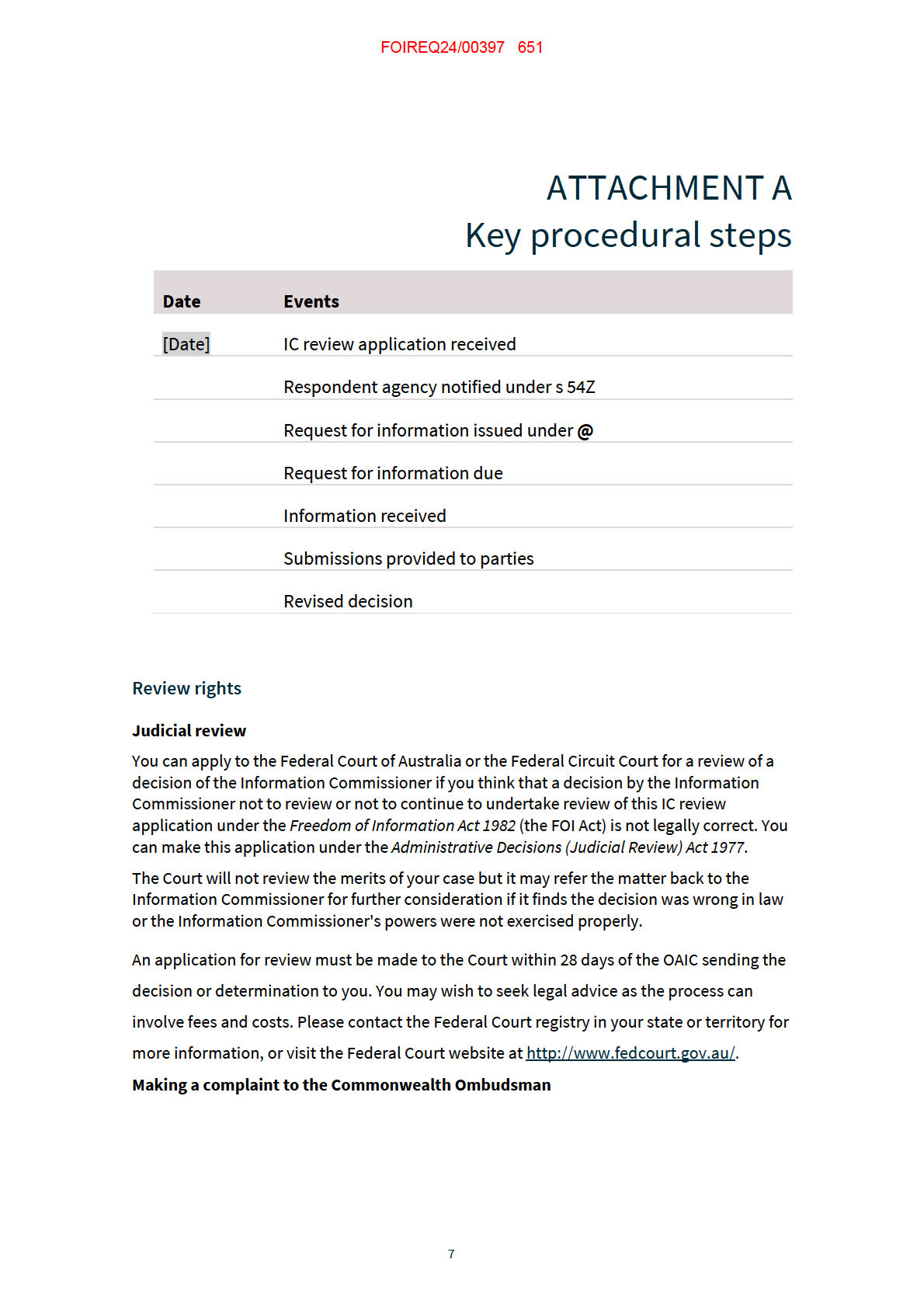
FOIREQ24/00397 652
If you believe you have been treated unfairly by the OAIC, you can make a complaint to the
Commonwealth Ombudsman (the Ombudsman). The Ombudsman's services are free. The
Ombudsman can investigate complaints about the administrative actions of Australian
Government agencies to see if you have been treated unfairly.
If the Ombudsman finds your complaint is justified, the Ombudsman can
recommend that the OAIC reconsider or change its action or decision or take any
other action that the Ombudsman considers is appropriate. You can contact the
Ombudsman's office for more information on 1300 362 072 or visit the
Commonwealth Ombudsman’s website at http://www.ombudsman.gov.au.
Accessing your information
If you would like access to the information that we hold about you, please contact
xxxxx@xxxx.xxx.xx. More information is available on the
Access our
information2 page on our website.
2 www.oaic.gov.au/about-us/access-our-information/.
8
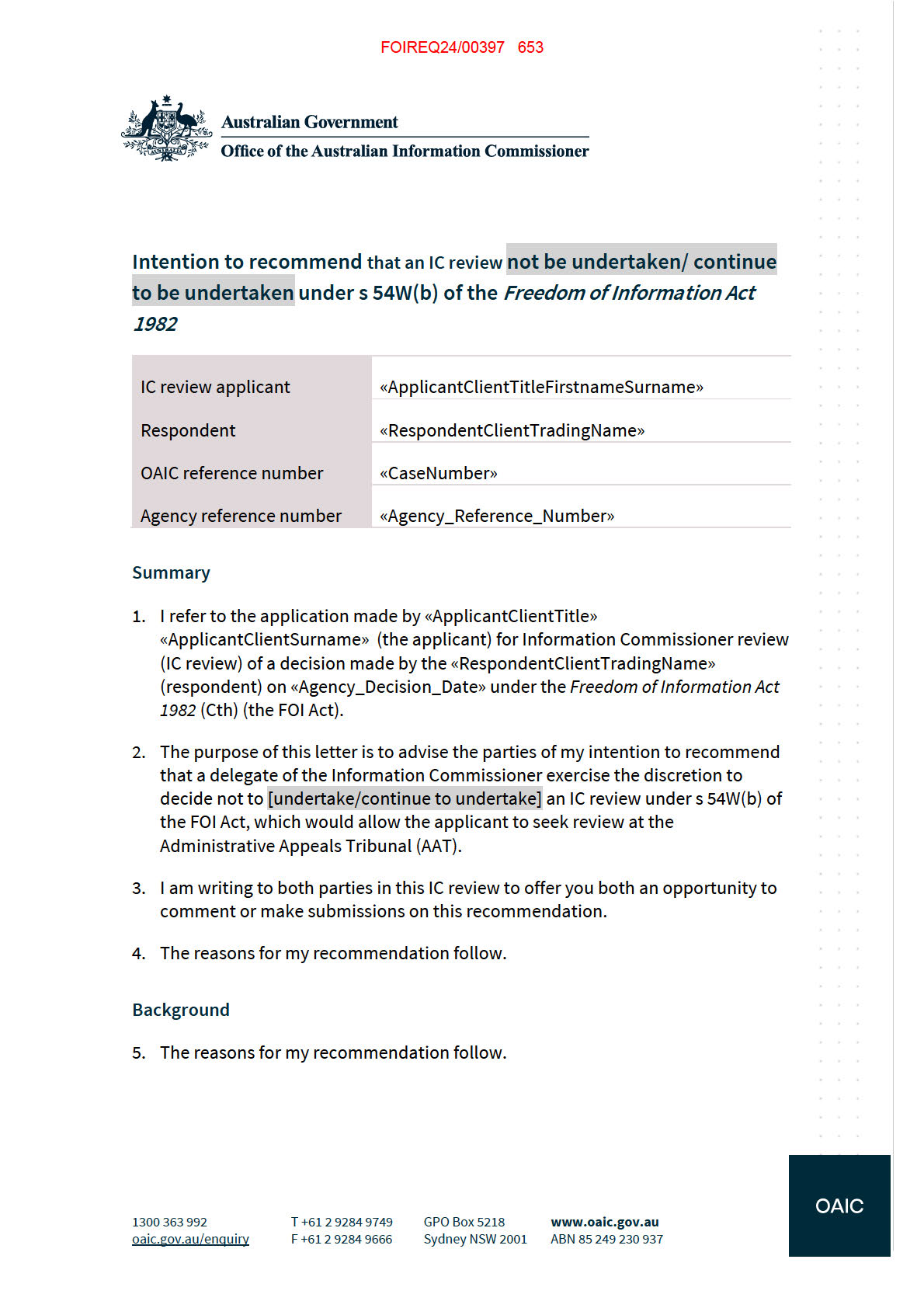
FOIREQ24/00397 654
Discretion not to [undertake/continue to undertake] an IC review
6. The reasons for my recommendation follow.
7. The effect of such a decision would be to finalise this IC review application and
allow the applicant to apply directly to the AAT. The applicant would then have
28 days to lodge an application with the AAT in accordance with ordinary AAT
processes. AAT filing fees may apply.1
8. The discretion in s 54W(b) of the FOI Act may be exercised where the Information
Commissioner is satisfied that the interests of the administration of the FOI Act
make it desirable that the IC reviewable decision be considered directly by the
AAT, rather than initially by the Information Commissioner.
9. The Explanatory Memorandum to the Freedom of Information Amendment
(Reform) Bill 2009 which created s 54W(b) states:
One of the reasons for retaining a right of review to the AAT is that, as an experienced review
body, the AAT can properly deal with highly contested applications. This provision enables
the Information Commissioner to decline to undertake a review if satisfied it would be more
appropriate and efficient for the application to be made directly to the AAT.
10. This is also referred to in the Guidelines issued by the Australian Information
Commissioner under s 93A (FOI Guidelines) at [10.88] – [10.89], which state:
The Information Commissioner can decline to undertake a review if satisfied ‘that the
interests of the administration of the [FOI] Act make it desirable’ that the AAT consider the
review application (s 54W(b)). It is intended that the Commissioner will resolve most
applications. Circumstances in which the Commissioner may decide that it is desirable for the
AAT to consider a matter instead of the Commissioner continuing with the IC review include:
• where the IC review is linked to ongoing proceedings before the AAT or a court
• where there is an apparent inconsistency between earlier IC review decisions and AAT
decisions
• where, should the application progress to an IC review decision, the IC review decision is
likely to be taken on appeal to the AAT on a disputed issue of fact
• where the FOI request under review is of a level of complexity that would be more
appropriately handled through the procedures of the AAT
• where there may be a perceived or actual conflict of interest in the Commissioner
undertaking review, including where:
1 See, https://www.aat.gov.au/apply-for-a-review/freedom-of-information-foi/fees
2
FOIREQ24/00397 655
o the FOI request under review was made to, or decided by, the
Information Commissioner or their delegate
o the FOI request or material at issue relate to specific functions exercised
by the Information Commissioner under the Privacy Act
o the applicant has active matters in other forums, including the AAT or
Federal Court and the Information Commissioner is the respondent
• where consideration by the AAT would further the objects of the FOI Act, particularly in
relation to the performance and exercise of functions and powers given by the FOI Act to
facilitate and promote public access to information, promptly and at the lowest
reasonable cost (s 3(4)).
The OAIC wil consult the parties involved in a matter before making a decision under
s 54W(b) to conclude an IC review.
11. The circumstances in which the Information Commissioner may consider it
desirable that the AAT consider the IC review application, as outlined in the FOI
Guidelines above, are not exhaustive. There will be circumstances that are not
listed where the Information Commissioner may deem it desirable to refer the
matter to the AAT.
12. The objects of the FOI Act provide that functions and powers under the FOI Act
are to be performed and exercised, as far as possible, to facilitate and promote
public access to information, promptly and at the lowest reasonable cost.
13. Further, in accordance with these objects, paragraph [10.18] of the FOI
Guidelines provides that IC reviews are intended to be a simple, practical and
cost-efficient method of external merits review.
[insert reasons for recommendation]
[Sample reasons for recommendation]
14. In this IC review, it is apparent that:
• The FOI decision under review is linked to ongoing proceedings currently
before the Administrative Appeals Tribunal. It is clear from the applicant’s
submissions in this IC review that the applicant is seeking access to
information about [provide details of proceedings].
• The FOI decision under review is complex and voluminous and resolving this
matter would require substantial allocation of OAIC resources. For example,
the scope of this IC review extends to various exemptions including [ss 22,
24A, 33, 42 and 47F] of the FOI Act and requires consideration of [number]
documents at issue.
3
FOIREQ24/00397 656
• The exemption of s 33 of the FOI Act adds complexity to this matter because
before the Information Commissioner can determine that a document is not
an exempt document under s 33 of the FOI Act, she must first request the
Inspector-General of Intelligence to appear and give evidence on the damage
that would, or could reasonably be expected to be caused to the security or
the Commonwealth, the defence of the Commonwealth or the international
relations of the Commonwealth if access to the document were given in
accordance with the request (s 55ZB of the FOI Act), and
• Given the complexity of the IC review and the subject matter of the
documents requested, I consider that any IC review decision is likely to be
taken on appeal to the AAT on a disputed issue of fact. In my preliminary
view, this IC review could more appropriately be handled through the
procedures of the AAT.
15. For these reasons, I intend to recommend to a delegate of the Information
Commissioner that they exercise the discretion not to [undertake/continue to
undertake] an IC review under s 54W(b), as I am of the view that it is in the
interests of the administration of the FOI Act that this review be closed and that
the applicant be provided the opportunity of applying directly to the AAT for
review.
16. The delegate of the Information Commissioner will review all material before the
OAIC in deciding whether to exercise the discretion to decide not to
[undertake/continue to undertake] a review in this case.
Next steps
17. If you disagree with this proposed recommendation, please write to us by
[@ 2
weeks] and advise us of your reasons. Your reasons will be taken into account
before a decision is made on whether to finalise this matter under s 54W(b).
18. In the absence of a response by this date this IC review application may be
finalised under s 54W(b), and the parties will be notified of their review rights.
Yours sincerely
«InvestigativeOfficerFirstnameSurname»
«InvestigativeOfficerPosition»
Freedom of information Regulatory Branch
4 September 2024
4
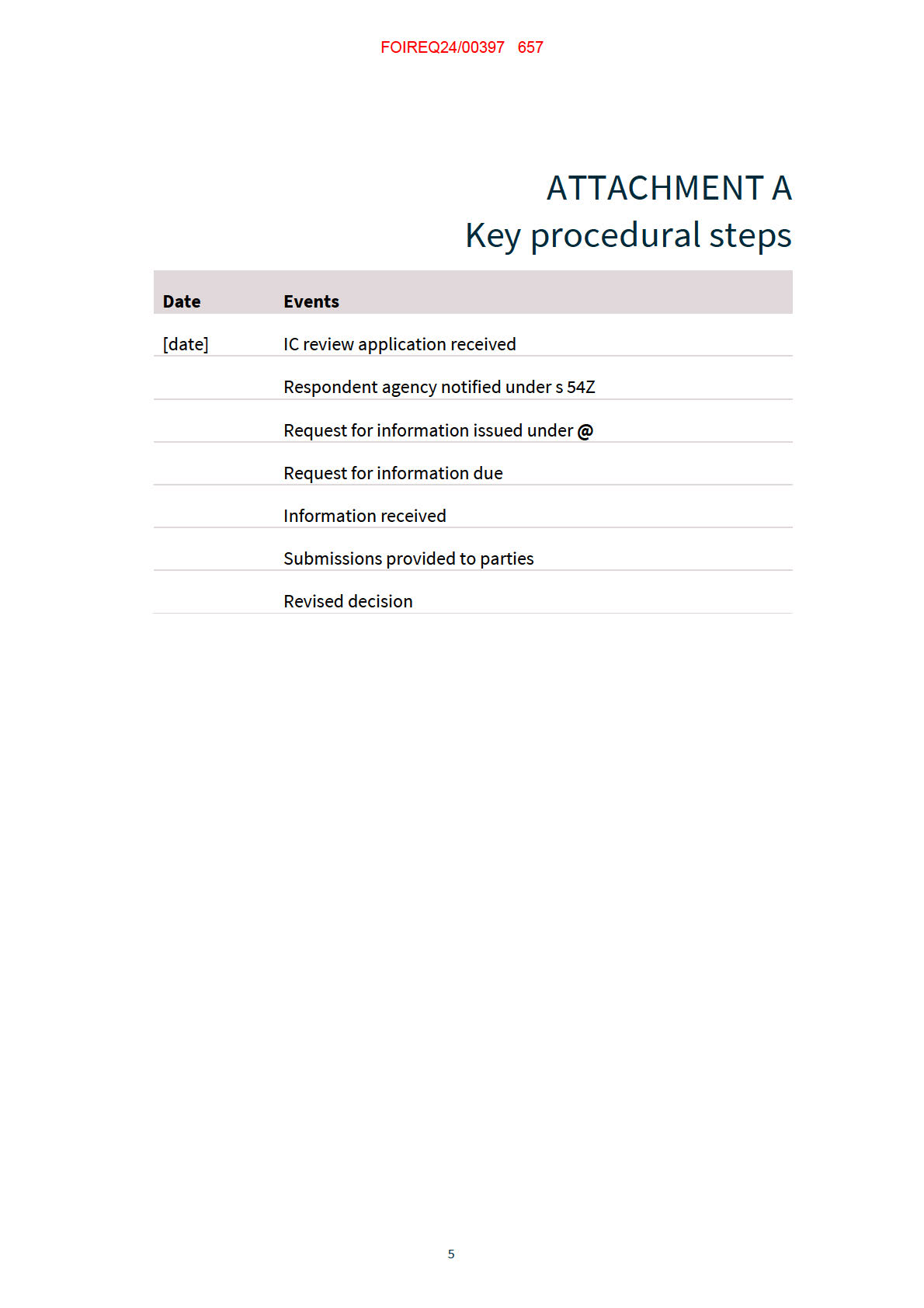
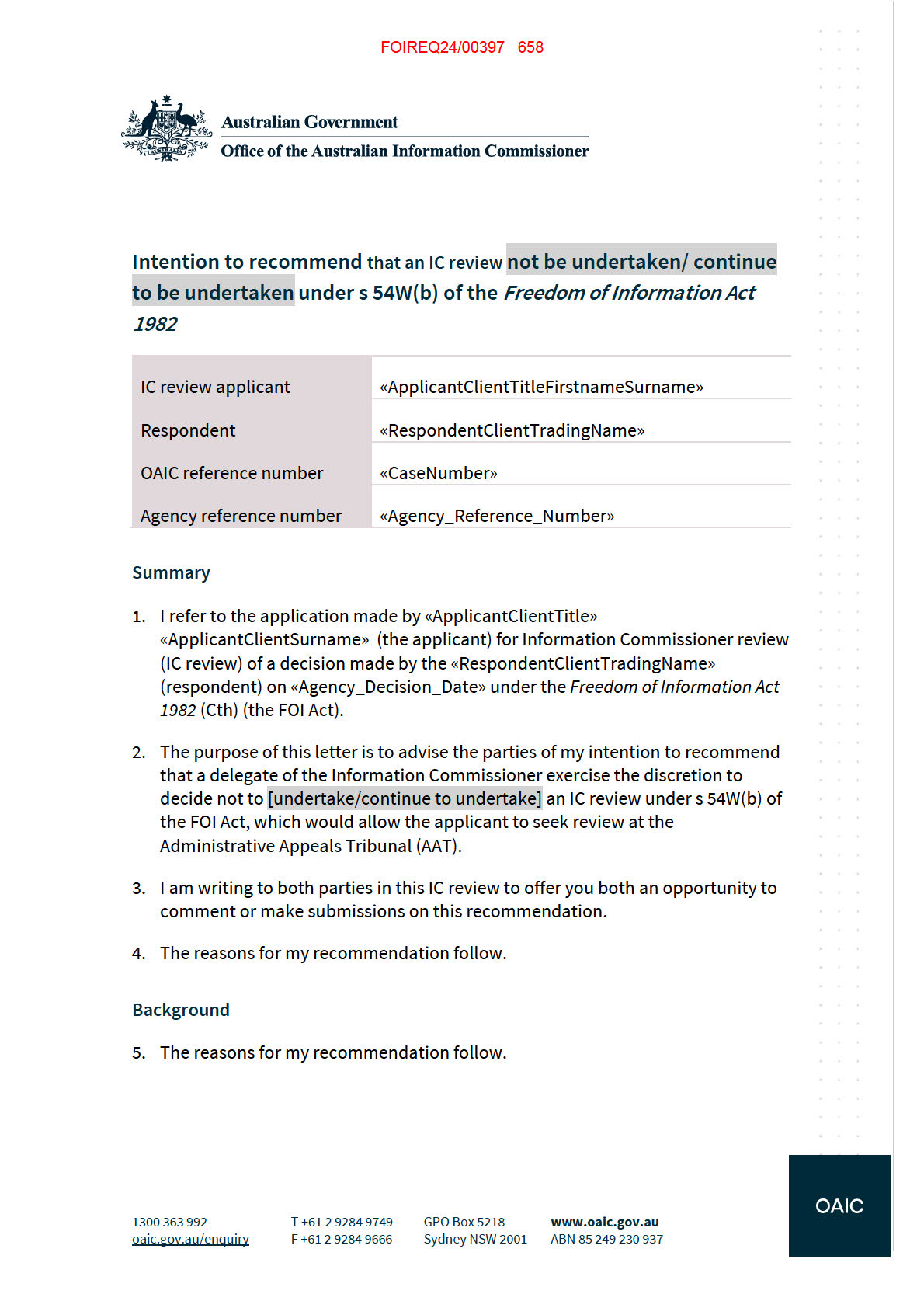
FOIREQ24/00397 659
Discretion not to [undertake/continue to undertake] an IC review
6. The reasons for my recommendation follow.
7. The effect of such a decision would be to finalise this IC review application and
allow the applicant to apply directly to the AAT. The applicant would then have
28 days to lodge an application with the AAT in accordance with ordinary AAT
processes. AAT filing fees may apply.1
8. The discretion in s 54W(b) of the FOI Act may be exercised where the Information
Commissioner is satisfied that the interests of the administration of the FOI Act
make it desirable that the IC reviewable decision be considered directly by the
AAT, rather than initially by the Information Commissioner.
9. The Explanatory Memorandum to the Freedom of Information Amendment
(Reform) Bill 2009 which created s 54W(b) states:
One of the reasons for retaining a right of review to the AAT is that, as an experienced review
body, the AAT can properly deal with highly contested applications. This provision enables
the Information Commissioner to decline to undertake a review if satisfied it would be more
appropriate and efficient for the application to be made directly to the AAT.
10. This is also referred to in the Guidelines issued by the Australian Information
Commissioner under s 93A (FOI Guidelines) at [10.88] – [10.89], which state:
The Information Commissioner can decline to undertake a review if satisfied ‘that the
interests of the administration of the [FOI] Act make it desirable’ that the AAT consider the
review application (s 54W(b)). It is intended that the Commissioner will resolve most
applications. Circumstances in which the Commissioner may decide that it is desirable for the
AAT to consider a matter instead of the Commissioner continuing with the IC review include:
• where the IC review is linked to ongoing proceedings before the AAT or a court
• where there is an apparent inconsistency between earlier IC review decisions and AAT
decisions
• where, should the application progress to an IC review decision, the IC review decision is
likely to be taken on appeal to the AAT on a disputed issue of fact
• where the FOI request under review is of a level of complexity that would be more
appropriately handled through the procedures of the AAT
• where there may be a perceived or actual conflict of interest in the Commissioner
undertaking review, including where:
1 See, https://www.aat.gov.au/apply-for-a-review/freedom-of-information-foi/fees
2
FOIREQ24/00397 660
o the FOI request under review was made to, or decided by, the
Information Commissioner or their delegate
o the FOI request or material at issue relate to specific functions exercised
by the Information Commissioner under the Privacy Act
o the applicant has active matters in other forums, including the AAT or
Federal Court and the Information Commissioner is the respondent
• where consideration by the AAT would further the objects of the FOI Act, particularly in
relation to the performance and exercise of functions and powers given by the FOI Act to
facilitate and promote public access to information, promptly and at the lowest
reasonable cost (s 3(4)).
The OAIC wil consult the parties involved in a matter before making a decision under
s 54W(b) to conclude an IC review.
11. The circumstances in which the Information Commissioner may consider it
desirable that the AAT consider the IC review application, as outlined in the FOI
Guidelines above, are not exhaustive. There will be circumstances that are not
listed where the Information Commissioner may deem it desirable to refer the
matter to the AAT.
12. The objects of the FOI Act provide that functions and powers under the FOI Act
are to be performed and exercised, as far as possible, to facilitate and promote
public access to information, promptly and at the lowest reasonable cost.
13. Further, in accordance with these objects, paragraph [10.18] of the FOI
Guidelines provides that IC reviews are intended to be a simple, practical and
cost-efficient method of external merits review.
[insert reasons for recommendation]
[Sample reasons for recommendation]
14. In this IC review, it is apparent that:
• The FOI decision under review is linked to ongoing proceedings currently
before the Administrative Appeals Tribunal. It is clear from the applicant’s
submissions in this IC review that the applicant is seeking access to
information about [provide details of proceedings].
• The FOI decision under review is complex and voluminous and resolving this
matter would require substantial allocation of OAIC resources. For example,
the scope of this IC review extends to various exemptions including [ss 22,
24A, 33, 42 and 47F] of the FOI Act and requires consideration of [number]
documents at issue.
3
FOIREQ24/00397 661
• The exemption of s 33 of the FOI Act adds complexity to this matter because
before the Information Commissioner can determine that a document is not
an exempt document under s 33 of the FOI Act, she must first request the
Inspector-General of Intelligence to appear and give evidence on the damage
that would, or could reasonably be expected to be caused to the security or
the Commonwealth, the defence of the Commonwealth or the international
relations of the Commonwealth if access to the document were given in
accordance with the request (s 55ZB of the FOI Act), and
• Given the complexity of the IC review and the subject matter of the
documents requested, I consider that any IC review decision is likely to be
taken on appeal to the AAT on a disputed issue of fact. In my preliminary
view, this IC review could more appropriately be handled through the
procedures of the AAT.
15. For these reasons, I intend to recommend to a delegate of the Information
Commissioner that they exercise the discretion not to [undertake/continue to
undertake] an IC review under s 54W(b), as I am of the view that it is in the
interests of the administration of the FOI Act that this review be closed and that
the applicant be provided the opportunity of applying directly to the AAT for
review.
16. The delegate of the Information Commissioner will review all material before the
OAIC in deciding whether to exercise the discretion to decide not to
[undertake/continue to undertake] a review in this case.
Next steps
17. If you disagree with this proposed recommendation, please write to us by
[@ 2
weeks] and advise us of your reasons. Your reasons will be taken into account
before a decision is made on whether to finalise this matter under s 54W(b).
18. In the absence of a response by this date this IC review application may be
finalised under s 54W(b), and the parties will be notified of their review rights.
Yours sincerely
«InvestigativeOfficerFirstnameSurname»
«InvestigativeOfficerPosition»
Freedom of information Regulatory Branch
4 September 2024
4
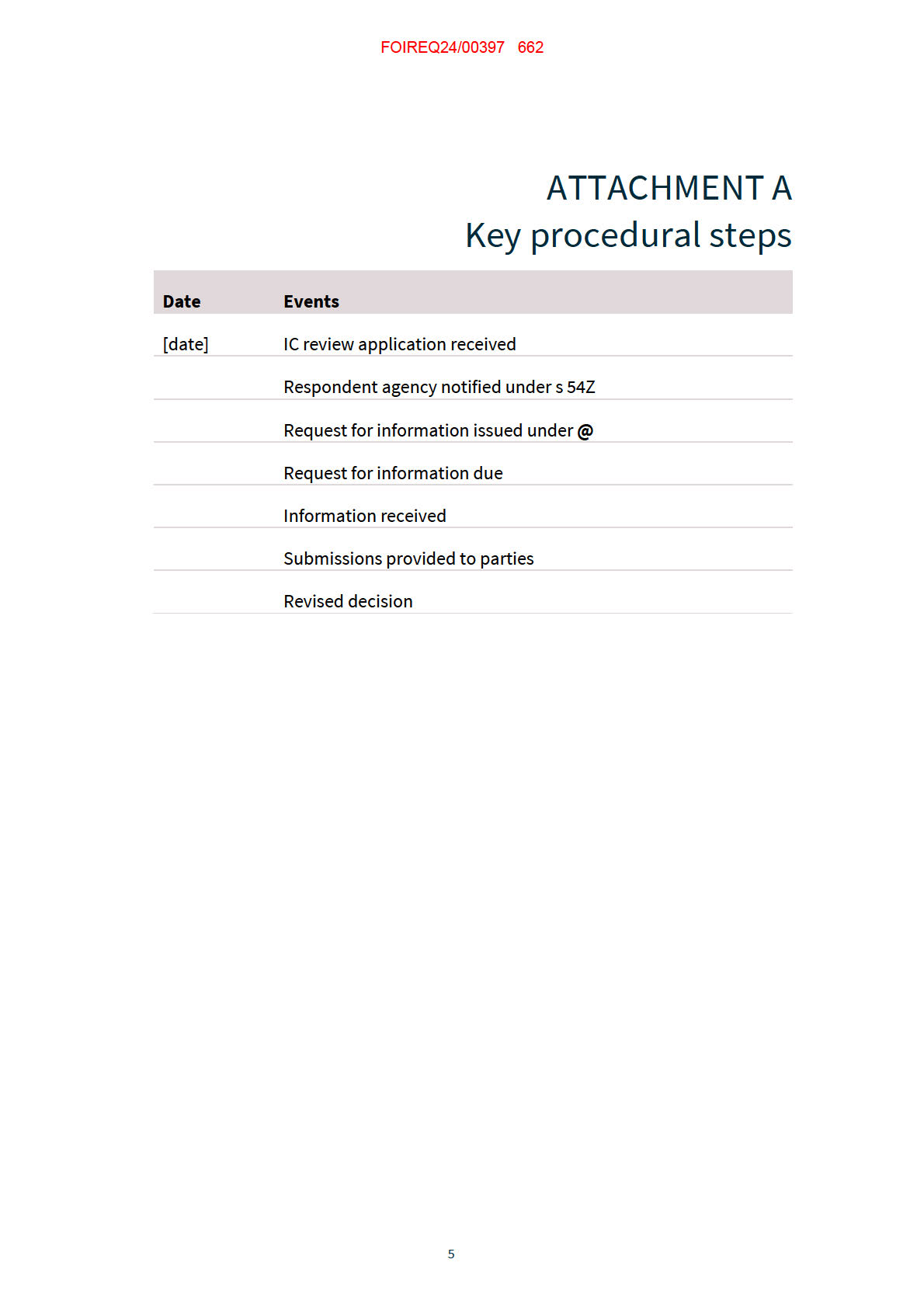
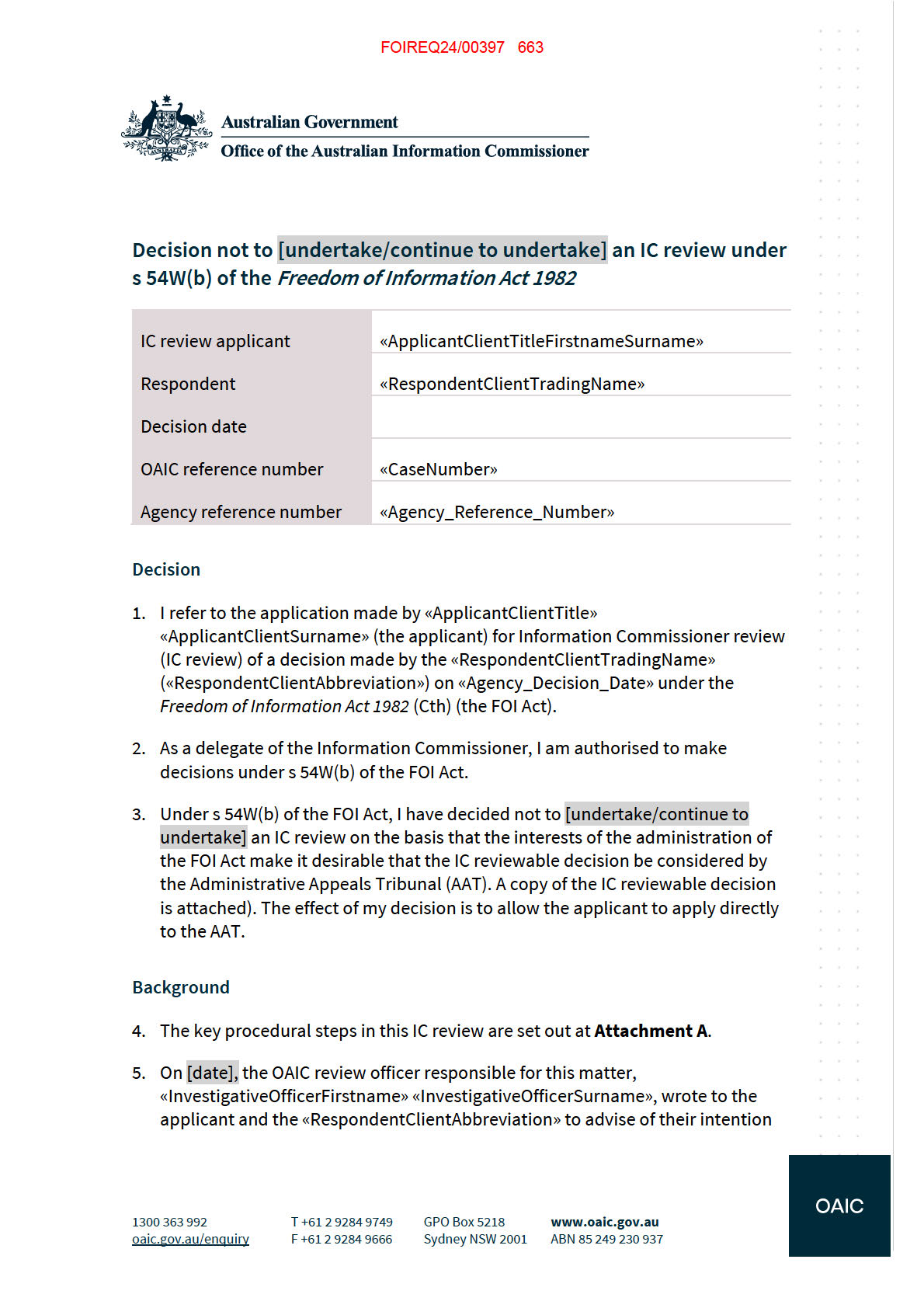
FOIREQ24/00397 664
to recommend to the delegate of the Information Commissioner that this
application for IC review be finalised under s 54W(b) of the FOI Act on the basis
that it is in the interests of the administration of the FOI Act that the IC
reviewable decision be considered by the AAT.
6. «InvestigativeOfficerFirstname» «InvestigativeOfficerSurname» invited the
parties to provide reasons if they disagreed with the proposed finalisation of this
IC review by [date].
7. [if relevant] Based on the information before me, the OAIC has not received a
response.
8. OR [insert details of response or that no response was received]
Discretion not to [undertake/continue to undertake] an IC review
9. Under s 54W(b) of the FOI Act, the Information Commissioner may decide not to
undertake a review, or not to continue to undertake a review, if the Information
Commissioner is satisfied that the interests of the administration of the FOI Act
make it desirable that the IC reviewable decision be considered by the AAT.
10. The effect of such a decision would be to finalise this IC review application and
allow the applicant to apply directly to the AAT. The applicant would then have
28 days to lodge an application with the AAT in accordance with ordinary AAT
processes. AAT filing fees may apply.1
11. The discretion in s 54W(b) of the FOI Act may be exercised where the Information
Commissioner is satisfied that the interests of the administration of the FOI Act
make it desirable that the IC reviewable decision be considered directly by the
AAT, rather than initially by the Information Commissioner.
12. The Explanatory Memorandum to the Freedom of Information Amendment
(Reform) Bill 2009 which created s 54W(b) states:
One of the reasons for retaining a right of review to the AAT is that, as an experienced review
body, the AAT can properly deal with highly contested applications. This provision enables
the Information Commissioner to decline to undertake a review if satisfied it would be more
appropriate and efficient for the application to be made directly to the AAT.
1 https://www.aat.gov.au/apply-for-a-review/freedom-of-information-foi/fees
2
FOIREQ24/00397 665
13. This is also referred to in the Guidelines issued by the Australian Information
Commissioner under s 93A (FOI Guidelines) at [10.88] – [10.89], which state:
The Information Commissioner can decline to undertake a review if satisfied ‘that the
interests of the administration of the [FOI] Act make it desirable’ that the AAT consider the
review application (s 54W(b)). It is intended that the Commissioner will resolve most
applications. Circumstances in which the Commissioner may decide that it is desirable for the
AAT to consider a matter instead of the Commissioner continuing with the IC review include:
• where the IC review is linked to ongoing proceedings before the AAT or a court
• where there is an apparent inconsistency between earlier IC review decisions and AAT
decisions
• where, should the application progress to an IC review decision, the IC review decision is
likely to be taken on appeal to the AAT on a disputed issue of fact
• where the FOI request under review is of a level of complexity that would be more
appropriately handled through the procedures of the AAT
• where there may be a perceived or actual conflict of interest in the Commissioner
undertaking review, including where:
o the FOI request under review was made to, or decided by, the
Information Commissioner or their delegate
o the FOI request or material at issue relate to specific functions exercised
by the Information Commissioner under the Privacy Act
o the applicant has active matters in other forums, including the AAT or
Federal Court and the Information Commissioner is the respondent
• where consideration by the AAT would further the objects of the FOI Act, particularly in
relation to the performance and exercise of functions and powers given by the FOI Act to
facilitate and promote public access to information, promptly and at the lowest
reasonable cost (s 3(4)).
The OAIC wil consult the parties involved in a matter before making a decision under
s 54W(b) to conclude an IC review.
14. The circumstances in which the Information Commissioner may consider it
desirable that the AAT consider the IC review application, as outlined in the FOI
Guidelines above, are not exhaustive. There will be circumstances that are not
listed where the Information Commissioner may deem it desirable to refer the
matter to the AAT.
15. The objects of the FOI Act provide that functions and powers under the FOI Act
are to be performed and exercised, as far as possible, to facilitate and promote
public access to information, promptly and at the lowest reasonable cost.
16. Further, in accordance with these objects, paragraph [10.18] of the FOI
Guidelines provides that IC reviews are intended to be a simple, practical and
cost-efficient method of external merits review.
3
FOIREQ24/00397 666
Reasons for decision
17. [If relevant, set out parties’ submissions here and include consideration of these
submissions]
18. I have considered the issues in this matter and I am satisfied that it is in the
interests of the administration of the FOI Act that the IC reviewable decision be
considered by the AAT because:
• [review and update as appropriate]
• the IC review is linked to ongoing proceedings in the AAT or a court
• there is an apparent inconsistency between earlier IC review decisions and
AAT decisions
• the exemptions applied to the documents under s [x] of the FOI Act in this
IC review are highly contested and there are a number of affected third
parties who must be given a reasonable opportunity to present their case
before a final decision is made (s 55(4)(b))
• the IC review decision is likely to be taken on appeal to the AAT on a
disputed issue of fact
• the FOI request under review is complex or voluminous, resolving the IC
review matter would require a substantial allocation of OAIC resources,
and the matter could more appropriately be handled through the
procedures of the AAT
• the OAIC is the primary decision-maker of the decision under review
• the material at issue relates to specific functions exercised by the
Commissioner under the Privacy Act.
[Sample reasons]
•
It is linked to ongoing proceedings currently before the Administrative
Appeals Tribunal. It is clear from the applicant’s submissions in this IC review
that the applicant is seeking access to information about [provide details of
proceedings].
•
The FOI request under review is complex and voluminous and resolving this
matter would require substantial allocation of OAIC resources. For example,
the scope of this IC review extends to various exemptions including ss 22, 24A,
33, 42 and 47F of the FOI Act and requires consideration of 200 documents at
issue.
4
FOIREQ24/00397 667
•
The exemption of s 33 of the FOI Act adds complexity to this matter because
before the Information Commissioner can determine that a document is not
an exempt document under s 33 of the FOI Act, she must first request the
Inspector-General of Intel igence to appear and give evidence on the
damage that would, or could reasonably be expected to be caused to the
security or the Commonwealth, the defence of the Commonwealth or the
international relations of the Commonwealth if access to the document were
given in accordance with the request (s 55ZB of the FOI Act), and
•
Further, in circumstances where there is a distinct possibility that, should the
IC review continue, any IC review decision will be taken on appeal by either
party to the AAT, I consider that it is desirable for the efficient administration
of the FOI Act that the IC reviewable decision is reviewed by the AAT at first
instance. I also consider that such an approach is consistent with the objects
of the FOI Act.
19. In deciding whether to exercise the discretion not to [undertake / continue to
undertake] a review, I have considered:
• [review and update as appropriate]
• The Explanatory Memorandum to the Freedom of Information Amendment
(Reform) Bill 2009 which created s 54W(b) states: One of the reasons for
retaining a right of review to the AAT is that, as an experienced review
body, the AAT can properly deal with highly contested applications. This
provision enables the Information Commissioner to decline to undertake a
review if satisfied it would be more appropriate and efficient for the
application to be made directly to the AAT.
• The objects of the FOI Act provide that functions and powers under the FOI
Act are to be performed and exercised, as far as possible, to facilitate and
promote public access to information, promptly and at the lowest
reasonable cost.
• In accordance with the objects of the FOI Act, paragraph [10.18] of the FOI
Guidelines provides that IC reviews are intended to be a simple, practical
and cost efficient method of external merit review.
• [Where the OAIC is the primary decision maker] The perceived conflict of
interest in the Information Commissioner reviewing a decision made by
their own agency.
20. For these reasons, as a delegate of the Information Commissioner, I have
decided to exercise my discretion to decide not to [undertake / continue to
5
FOIREQ24/00397 668
undertake] an IC review under s 54W(b) of the FOI Act. I confirm that this IC
review is now closed.
Next steps
21. The applicant now has 28 calendar days from the date of this notice to make an
application for review of the IC reviewable decision to the AAT in accordance
with s 57A of the FOI Act.
22. If either party disagrees with my decision under s 54W(b) of the FOI Act,
information about your review rights is set out below.
Yours sincerely
[Director Name]
[Director]
Freedom of information Branch
4 September 2024
6
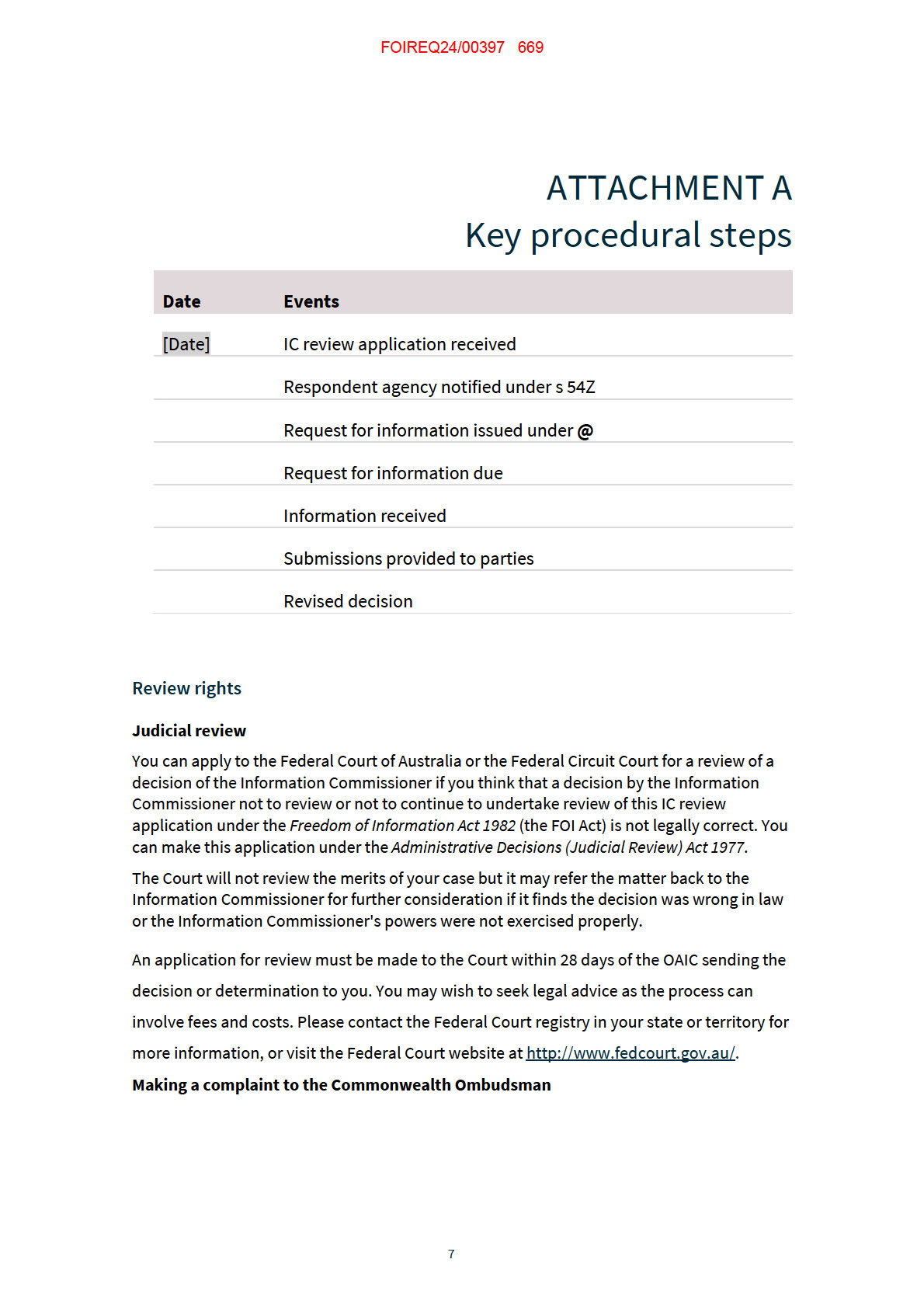
FOIREQ24/00397 670
If you believe you have been treated unfairly by the OAIC, you can make a complaint to the
Commonwealth Ombudsman (the Ombudsman). The Ombudsman's services are free. The
Ombudsman can investigate complaints about the administrative actions of Australian
Government agencies to see if you have been treated unfairly.
If the Ombudsman finds your complaint is justified, the Ombudsman can
recommend that the OAIC reconsider or change its action or decision or take any
other action that the Ombudsman considers is appropriate. You can contact the
Ombudsman's office for more information on 1300 362 072 or visit the
Commonwealth Ombudsman’s website at http://www.ombudsman.gov.au.
Accessing your information
If you would like access to the information that we hold about you, please contact
xxxxx@xxxx.xxx.xx. More information is available on the
Access our
information2 page on our website.
2 www.oaic.gov.au/about-us/access-our-information/.
8
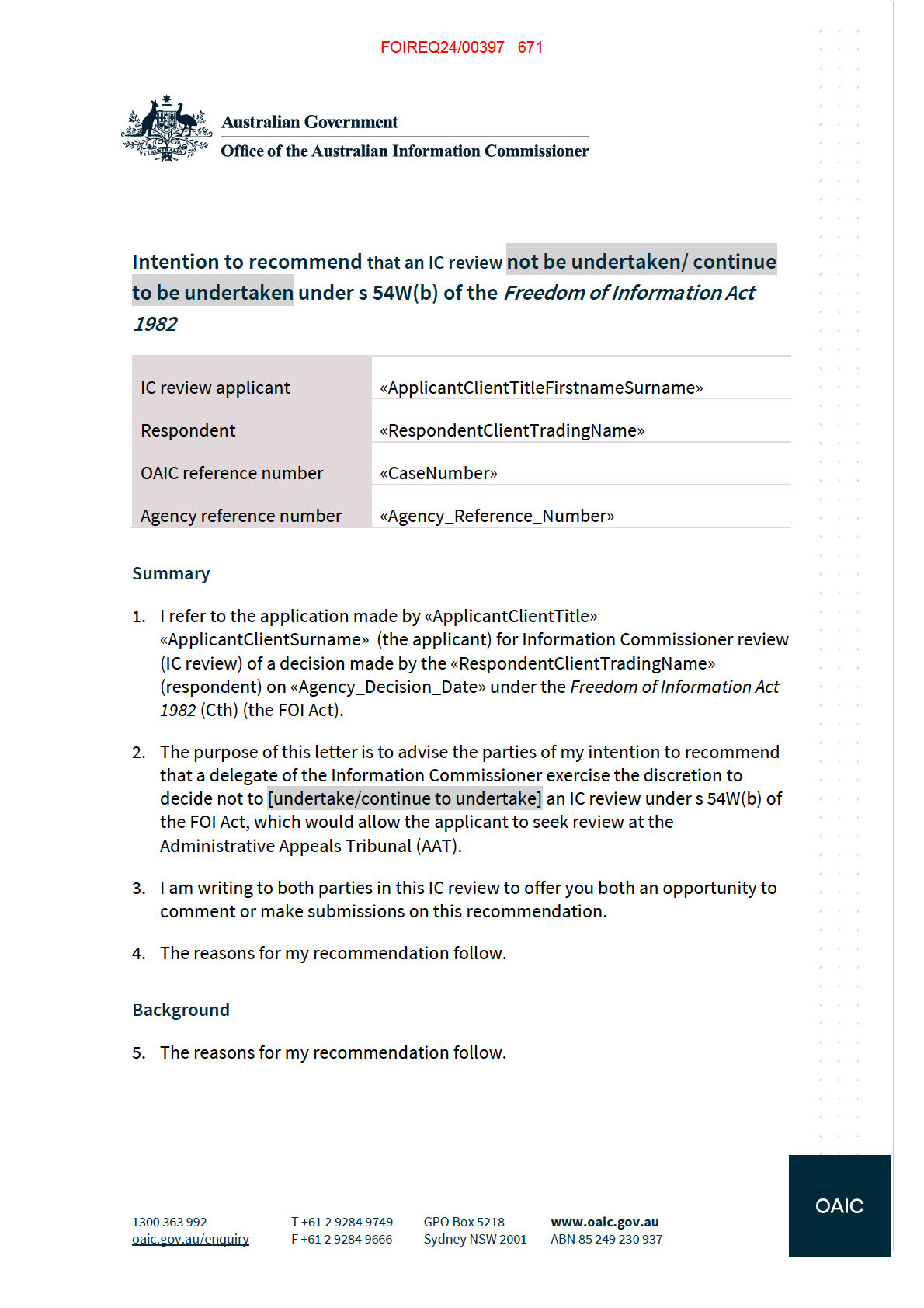
FOIREQ24/00397 672
Discretion not to [undertake/continue to undertake] an IC review
6. The reasons for my recommendation follow.
7. The effect of such a decision would be to finalise this IC review application and
allow the applicant to apply directly to the AAT. The applicant would then have
28 days to lodge an application with the AAT in accordance with ordinary AAT
processes. AAT filing fees may apply.1
8. The discretion in s 54W(b) of the FOI Act may be exercised where the Information
Commissioner is satisfied that the interests of the administration of the FOI Act
make it desirable that the IC reviewable decision be considered directly by the
AAT, rather than initially by the Information Commissioner.
9. The Explanatory Memorandum to the Freedom of Information Amendment
(Reform) Bill 2009 which created s 54W(b) states:
One of the reasons for retaining a right of review to the AAT is that, as an experienced review
body, the AAT can properly deal with highly contested applications. This provision enables
the Information Commissioner to decline to undertake a review if satisfied it would be more
appropriate and efficient for the application to be made directly to the AAT.
10. This is also referred to in the Guidelines issued by the Australian Information
Commissioner under s 93A (FOI Guidelines) at [10.88] – [10.89], which state:
The Information Commissioner can decline to undertake a review if satisfied ‘that the
interests of the administration of the [FOI] Act make it desirable’ that the AAT consider the
review application (s 54W(b)). It is intended that the Commissioner will resolve most
applications. Circumstances in which the Commissioner may decide that it is desirable for the
AAT to consider a matter instead of the Commissioner continuing with the IC review include:
• where the IC review is linked to ongoing proceedings before the AAT or a court
• where there is an apparent inconsistency between earlier IC review decisions and AAT
decisions
• where, should the application progress to an IC review decision, the IC review decision is
likely to be taken on appeal to the AAT on a disputed issue of fact
• where the FOI request under review is of a level of complexity that would be more
appropriately handled through the procedures of the AAT
• where there may be a perceived or actual conflict of interest in the Commissioner
undertaking review, including where:
1 See, https://www.aat.gov.au/apply-for-a-review/freedom-of-information-foi/fees
2
FOIREQ24/00397 673
o the FOI request under review was made to, or decided by, the
Information Commissioner or their delegate
o the FOI request or material at issue relate to specific functions exercised
by the Information Commissioner under the Privacy Act
o the applicant has active matters in other forums, including the AAT or
Federal Court and the Information Commissioner is the respondent
• where consideration by the AAT would further the objects of the FOI Act, particularly in
relation to the performance and exercise of functions and powers given by the FOI Act to
facilitate and promote public access to information, promptly and at the lowest
reasonable cost (s 3(4)).
The OAIC will consult the parties involved in a matter before making a decision under
s 54W(b) to conclude an IC review.
11. The circumstances in which the Information Commissioner may consider it
desirable that the AAT consider the IC review application, as outlined in the FOI
Guidelines above, are not exhaustive. There will be circumstances that are not
listed where the Information Commissioner may deem it desirable to refer the
matter to the AAT.
12. The objects of the FOI Act provide that functions and powers under the FOI Act
are to be performed and exercised, as far as possible, to facilitate and promote
public access to information, promptly and at the lowest reasonable cost.
13. Further, in accordance with these objects, paragraph [10.18] of the FOI
Guidelines provides that IC reviews are intended to be a simple, practical and
cost-efficient method of external merits review.
[insert reasons for recommendation]
[Sample reasons for recommendation]
14. In this IC review, it is apparent that:
• The FOI decision under review is linked to ongoing proceedings currently
before the Administrative Appeals Tribunal. It is clear from the applicant’s
submissions in this IC review that the applicant is seeking access to
information about [provide details of proceedings].
• The FOI decision under review is complex and voluminous and resolving this
matter would require substantial allocation of OAIC resources. For example,
the scope of this IC review extends to various exemptions including [ss 22,
24A, 33, 42 and 47F] of the FOI Act and requires consideration of [number]
documents at issue.
3
FOIREQ24/00397 674
• The exemption of s 33 of the FOI Act adds complexity to this matter because
before the Information Commissioner can determine that a document is not
an exempt document under s 33 of the FOI Act, she must first request the
Inspector-General of Intelligence to appear and give evidence on the damage
that would, or could reasonably be expected to be caused to the security or
the Commonwealth, the defence of the Commonwealth or the international
relations of the Commonwealth if access to the document were given in
accordance with the request (s 55ZB of the FOI Act), and
• Given the complexity of the IC review and the subject matter of the
documents requested, I consider that any IC review decision is likely to be
taken on appeal to the AAT on a disputed issue of fact. In my preliminary
view, this IC review could more appropriately be handled through the
procedures of the AAT.
15. For these reasons, I intend to recommend to a delegate of the Information
Commissioner that they exercise the discretion not to [undertake/continue to
undertake] an IC review under s 54W(b), as I am of the view that it is in the
interests of the administration of the FOI Act that this review be closed and that
the applicant be provided the opportunity of applying directly to the AAT for
review.
16. The delegate of the Information Commissioner will review al material before the
OAIC in deciding whether to exercise the discretion to decide not to
[undertake/continue to undertake] a review in this case.
Next steps
17. If you disagree with this proposed recommendation, please write to us by
[@ 2
weeks] and advise us of your reasons. Your reasons wil be taken into account
before a decision is made on whether to finalise this matter under s 54W(b).
18. In the absence of a response by this date this IC review application may be
finalised under s 54W(b), and the parties will be notified of their review rights.
Yours sincerely
«InvestigativeOfficerFirstnameSurname»
«InvestigativeOfficerPosition»
Freedom of information Regulatory Branch
5 September 2024
4
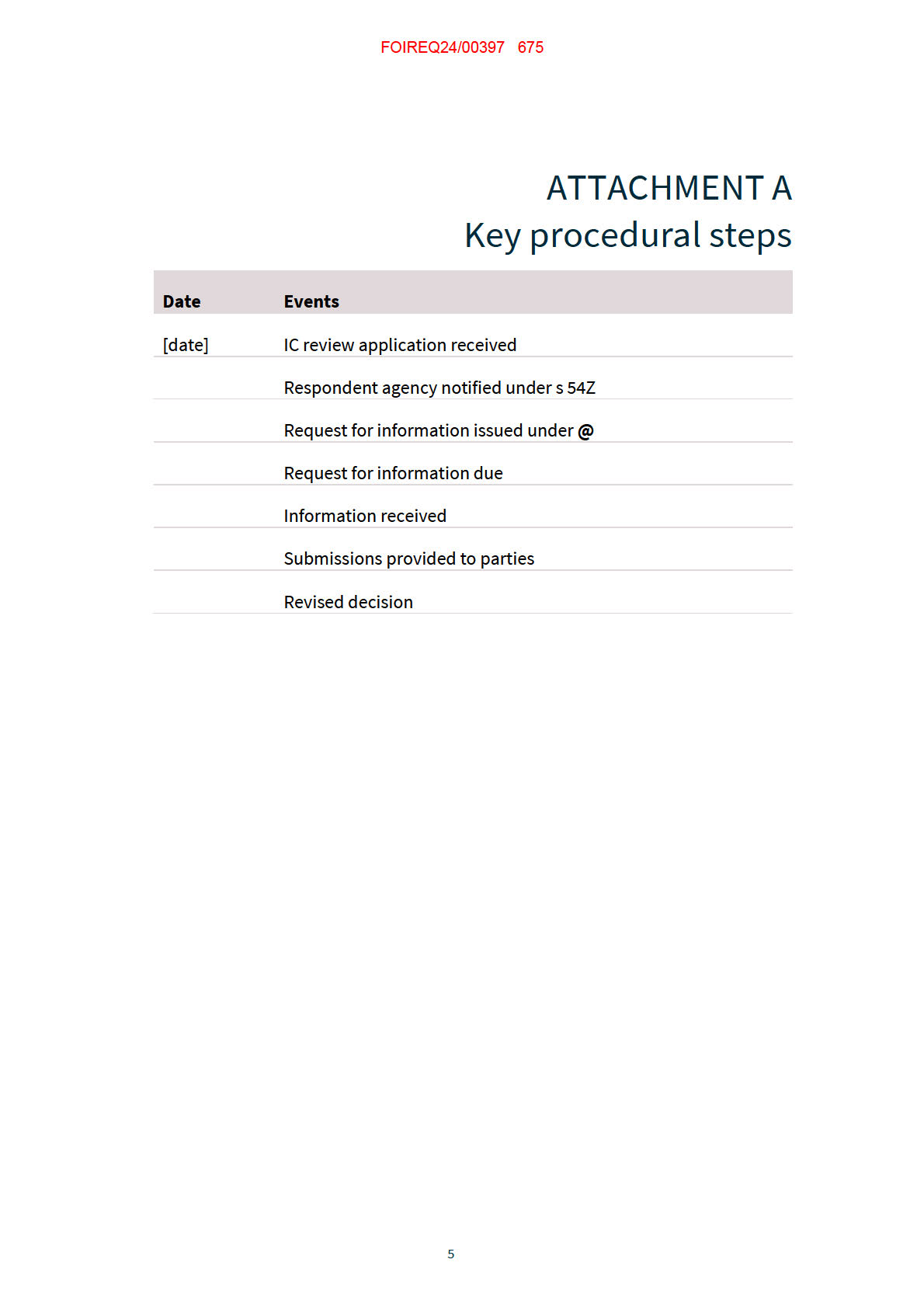
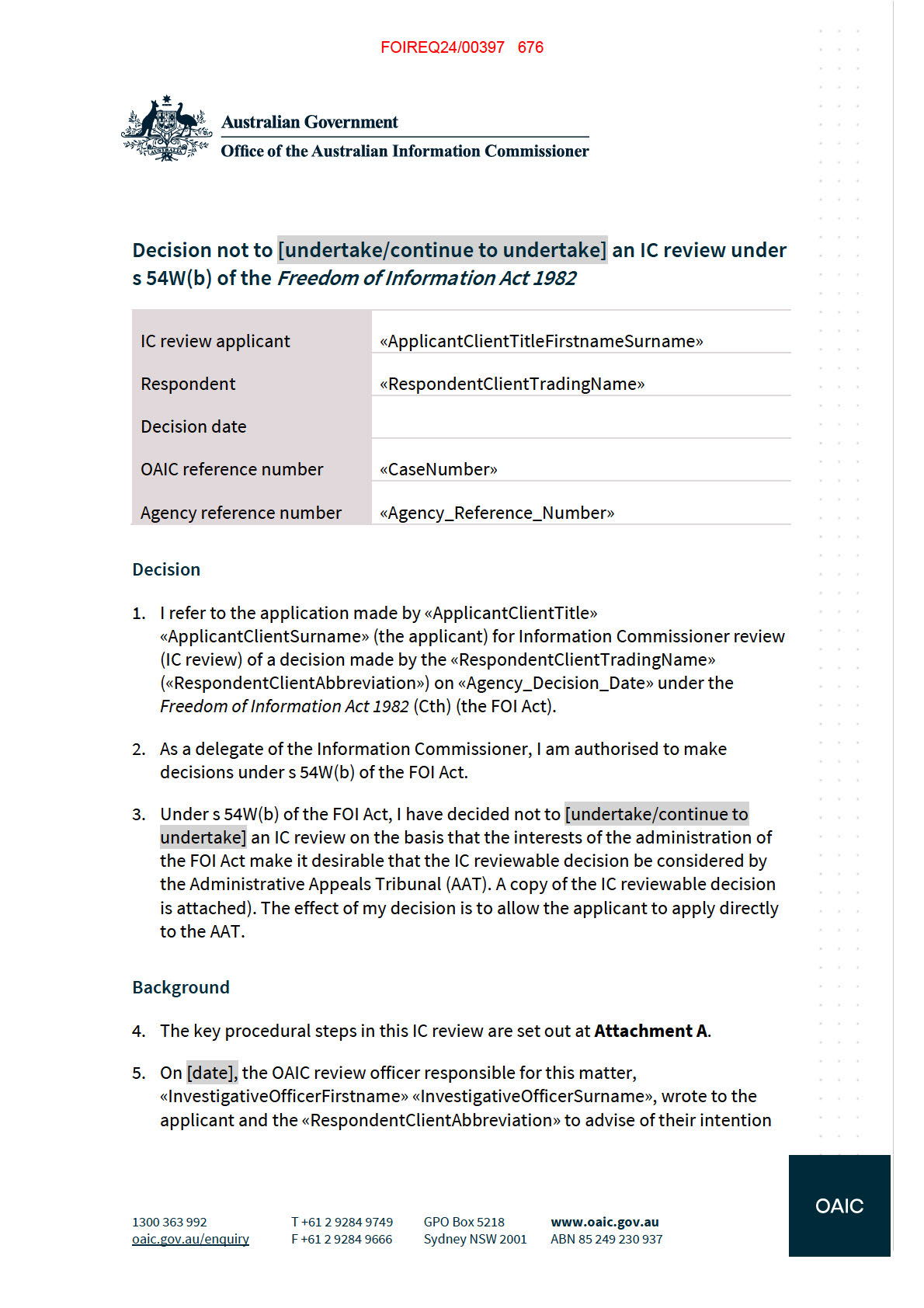
FOIREQ24/00397 677
to recommend to the delegate of the Information Commissioner that this
application for IC review be finalised under s 54W(b) of the FOI Act on the basis
that it is in the interests of the administration of the FOI Act that the IC
reviewable decision be considered by the AAT.
6. «InvestigativeOfficerFirstname» «InvestigativeOfficerSurname» invited the
parties to provide reasons if they disagreed with the proposed finalisation of this
IC review by [date].
7. [if relevant] Based on the information before me, the OAIC has not received a
response.
8. OR [insert details of response or that no response was received]
Discretion not to [undertake/continue to undertake] an IC review
9. Under s 54W(b) of the FOI Act, the Information Commissioner may decide not to
undertake a review, or not to continue to undertake a review, if the Information
Commissioner is satisfied that the interests of the administration of the FOI Act
make it desirable that the IC reviewable decision be considered by the AAT.
10. The effect of such a decision would be to finalise this IC review application and
allow the applicant to apply directly to the AAT. The applicant would then have
28 days to lodge an application with the AAT in accordance with ordinary AAT
processes. AAT filing fees may apply.1
11. The discretion in s 54W(b) of the FOI Act may be exercised where the Information
Commissioner is satisfied that the interests of the administration of the FOI Act
make it desirable that the IC reviewable decision be considered directly by the
AAT, rather than initially by the Information Commissioner.
12. The Explanatory Memorandum to the Freedom of Information Amendment
(Reform) Bill 2009 which created s 54W(b) states:
One of the reasons for retaining a right of review to the AAT is that, as an experienced review
body, the AAT can properly deal with highly contested applications. This provision enables
the Information Commissioner to decline to undertake a review if satisfied it would be more
appropriate and efficient for the application to be made directly to the AAT.
1 https://www.aat.gov.au/apply-for-a-review/freedom-of-information-foi/fees
2
FOIREQ24/00397 678
13. This is also referred to in the Guidelines issued by the Australian Information
Commissioner under s 93A (FOI Guidelines) at [10.88] – [10.89], which state:
The Information Commissioner can decline to undertake a review if satisfied ‘that the
interests of the administration of the [FOI] Act make it desirable’ that the AAT consider the
review application (s 54W(b)). It is intended that the Commissioner will resolve most
applications. Circumstances in which the Commissioner may decide that it is desirable for the
AAT to consider a matter instead of the Commissioner continuing with the IC review include:
• where the IC review is linked to ongoing proceedings before the AAT or a court
• where there is an apparent inconsistency between earlier IC review decisions and AAT
decisions
• where, should the application progress to an IC review decision, the IC review decision is
likely to be taken on appeal to the AAT on a disputed issue of fact
• where the FOI request under review is of a level of complexity that would be more
appropriately handled through the procedures of the AAT
• where there may be a perceived or actual conflict of interest in the Commissioner
undertaking review, including where:
o the FOI request under review was made to, or decided by, the
Information Commissioner or their delegate
o the FOI request or material at issue relate to specific functions exercised
by the Information Commissioner under the Privacy Act
o the applicant has active matters in other forums, including the AAT or
Federal Court and the Information Commissioner is the respondent
• where consideration by the AAT would further the objects of the FOI Act, particularly in
relation to the performance and exercise of functions and powers given by the FOI Act to
facilitate and promote public access to information, promptly and at the lowest
reasonable cost (s 3(4)).
The OAIC will consult the parties involved in a matter before making a decision under
s 54W(b) to conclude an IC review.
14. The circumstances in which the Information Commissioner may consider it
desirable that the AAT consider the IC review application, as outlined in the FOI
Guidelines above, are not exhaustive. There will be circumstances that are not
listed where the Information Commissioner may deem it desirable to refer the
matter to the AAT.
15. The objects of the FOI Act provide that functions and powers under the FOI Act
are to be performed and exercised, as far as possible, to facilitate and promote
public access to information, promptly and at the lowest reasonable cost.
16. Further, in accordance with these objects, paragraph [10.18] of the FOI
Guidelines provides that IC reviews are intended to be a simple, practical and
cost-efficient method of external merits review.
3
FOIREQ24/00397 679
Reasons for decision
17. [If relevant, set out parties’ submissions here and include consideration of these
submissions]
18. I have considered the issues in this matter and I am satisfied that it is in the
interests of the administration of the FOI Act that the IC reviewable decision be
considered by the AAT because:
• [review and update as appropriate]
• the IC review is linked to ongoing proceedings in the AAT or a court
• there is an apparent inconsistency between earlier IC review decisions and
AAT decisions
• the exemptions applied to the documents under s [x] of the FOI Act in this
IC review are highly contested and there are a number of affected third
parties who must be given a reasonable opportunity to present their case
before a final decision is made (s 55(4)(b))
• the IC review decision is likely to be taken on appeal to the AAT on a
disputed issue of fact
• the FOI request under review is complex or voluminous, resolving the IC
review matter would require a substantial allocation of OAIC resources,
and the matter could more appropriately be handled through the
procedures of the AAT
• the OAIC is the primary decision-maker of the decision under review
• the material at issue relates to specific functions exercised by the
Commissioner under the Privacy Act.
[Sample reasons]
•
It is linked to ongoing proceedings currently before the Administrative
Appeals Tribunal. It is clear from the applicant’s submissions in this IC review
that the applicant is seeking access to information about [provide details of
proceedings].
•
The FOI request under review is complex and voluminous and resolving this
matter would require substantial al ocation of OAIC resources. For example,
the scope of this IC review extends to various exemptions including ss 22, 24A,
33, 42 and 47F of the FOI Act and requires consideration of 200 documents at
issue.
4
FOIREQ24/00397 680
•
The exemption of s 33 of the FOI Act adds complexity to this matter because
before the Information Commissioner can determine that a document is not
an exempt document under s 33 of the FOI Act, she must first request the
Inspector-General of Intel igence to appear and give evidence on the
damage that would, or could reasonably be expected to be caused to the
security or the Commonwealth, the defence of the Commonwealth or the
international relations of the Commonwealth if access to the document were
given in accordance with the request (s 55ZB of the FOI Act), and
•
Further, in circumstances where there is a distinct possibility that, should the
IC review continue, any IC review decision wil be taken on appeal by either
party to the AAT, I consider that it is desirable for the efficient administration
of the FOI Act that the IC reviewable decision is reviewed by the AAT at first
instance. I also consider that such an approach is consistent with the objects
of the FOI Act.
19. In deciding whether to exercise the discretion not to [undertake / continue to
undertake] a review, I have considered:
• [review and update as appropriate]
• The Explanatory Memorandum to the Freedom of Information Amendment
(Reform) Bill 2009 which created s 54W(b) states: One of the reasons for
retaining a right of review to the AAT is that, as an experienced review
body, the AAT can properly deal with highly contested applications. This
provision enables the Information Commissioner to decline to undertake a
review if satisfied it would be more appropriate and efficient for the
application to be made directly to the AAT.
• The objects of the FOI Act provide that functions and powers under the FOI
Act are to be performed and exercised, as far as possible, to facilitate and
promote public access to information, promptly and at the lowest
reasonable cost.
• In accordance with the objects of the FOI Act, paragraph [10.18] of the FOI
Guidelines provides that IC reviews are intended to be a simple, practical
and cost efficient method of external merit review.
• [Where the OAIC is the primary decision maker] The perceived conflict of
interest in the Information Commissioner reviewing a decision made by
their own agency.
20. For these reasons, as a delegate of the Information Commissioner, I have
decided to exercise my discretion to decide not to [undertake / continue to
5
FOIREQ24/00397 681
undertake] an IC review under s 54W(b) of the FOI Act. I confirm that this IC
review is now closed.
Next steps
21. The applicant now has 28 calendar days from the date of this notice to make an
application for review of the IC reviewable decision to the AAT in accordance
with s 57A of the FOI Act.
22. If either party disagrees with my decision under s 54W(b) of the FOI Act,
information about your review rights is set out below.
Yours sincerely
[Director Name]
[Director]
Freedom of information Branch
5 September 2024
6
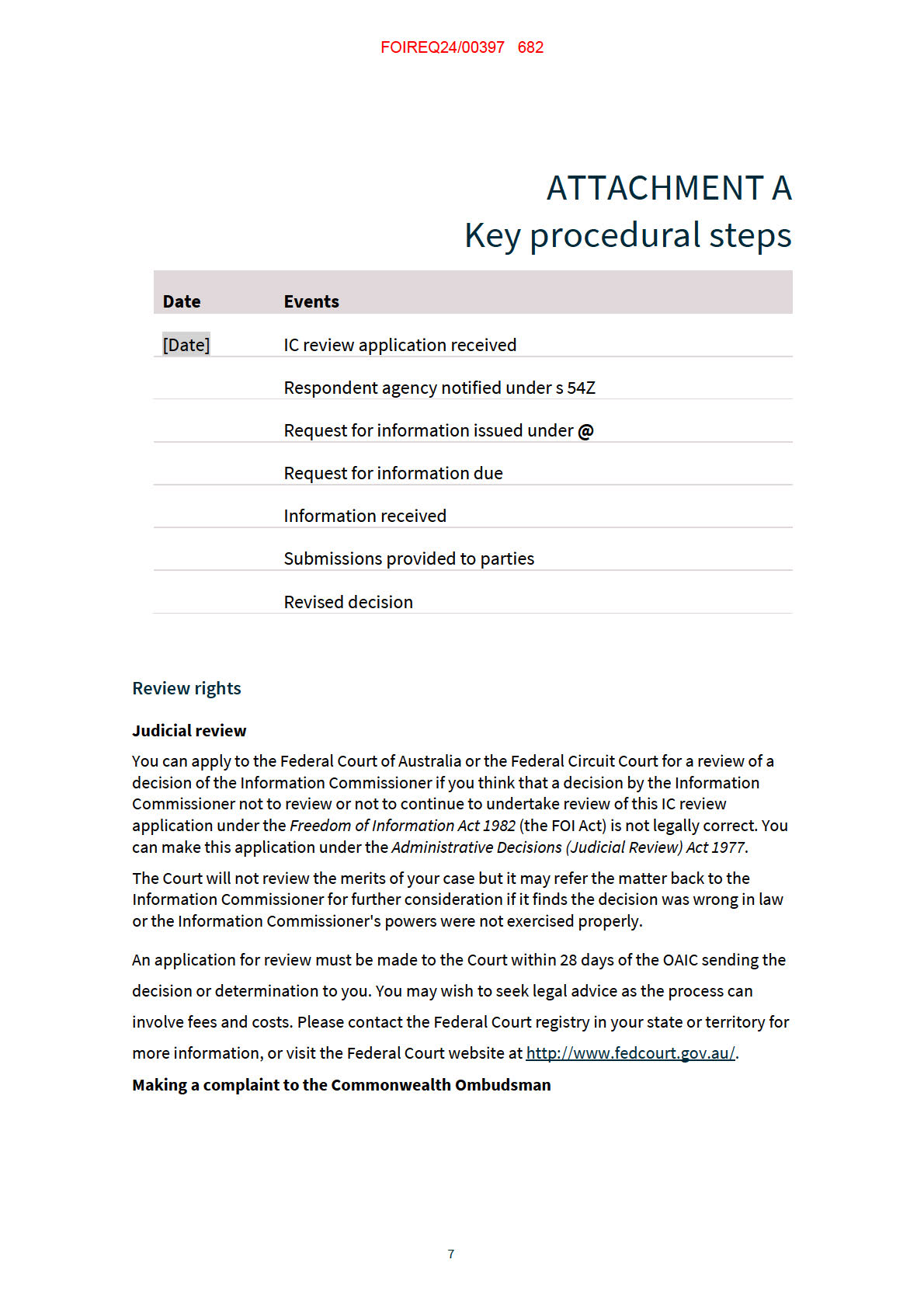
FOIREQ24/00397 683
If you believe you have been treated unfairly by the OAIC, you can make a complaint to the
Commonwealth Ombudsman (the Ombudsman). The Ombudsman's services are free. The
Ombudsman can investigate complaints about the administrative actions of Australian
Government agencies to see if you have been treated unfairly.
If the Ombudsman finds your complaint is justified, the Ombudsman can
recommend that the OAIC reconsider or change its action or decision or take any
other action that the Ombudsman considers is appropriate. You can contact the
Ombudsman's office for more information on 1300 362 072 or visit the
Commonwealth Ombudsman’s website at http://www.ombudsman.gov.au.
Accessing your information
If you would like access to the information that we hold about you, please contact
xxxxx@xxxx.xxx.xx. More information is available on the
Access our
information2 page on our website.
2 www.oaic.gov.au/about-us/access-our-information/.
8
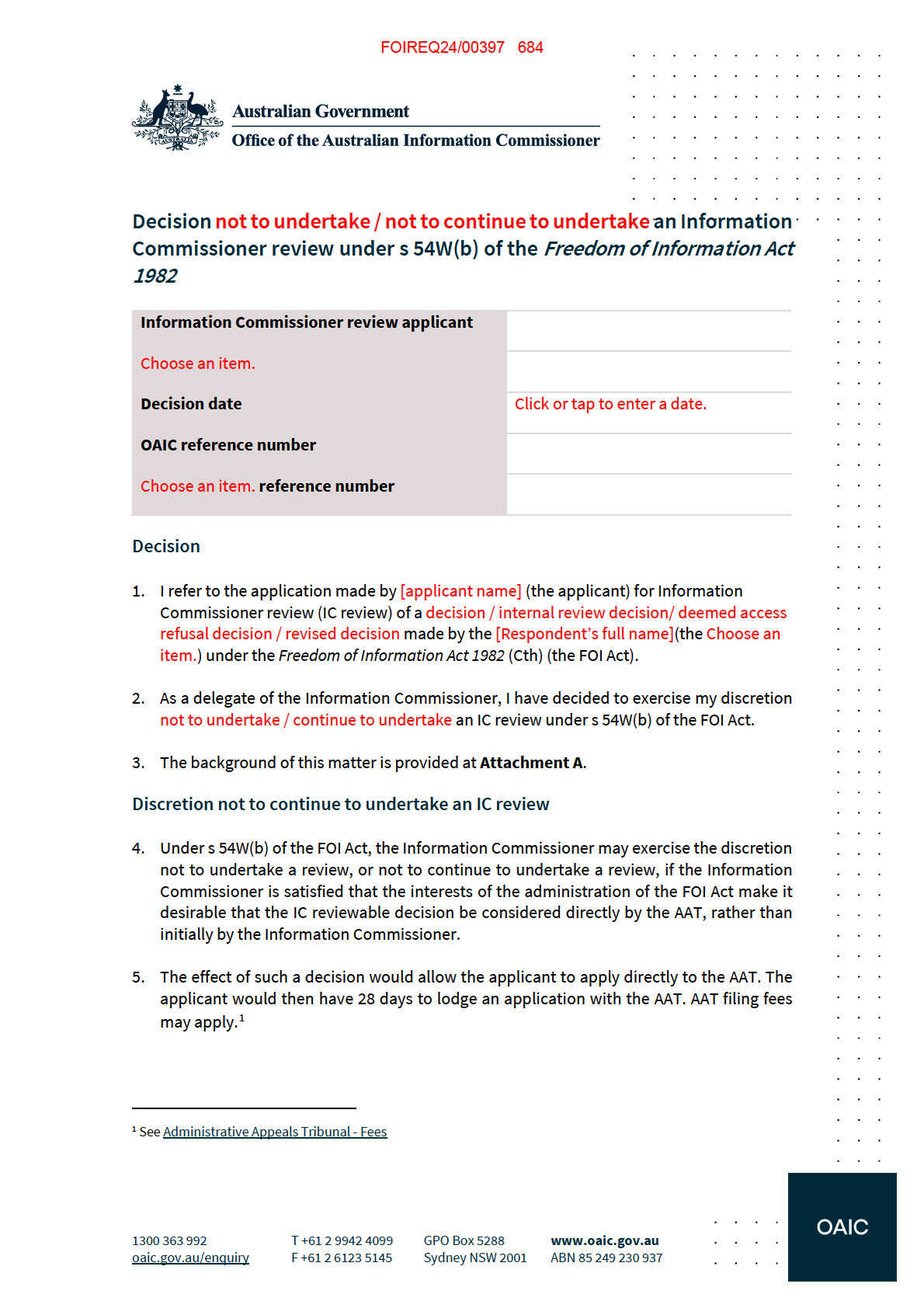
FOIREQ24/00397 685
6. This is also referred to in the Guidelines issued by the Australian Information
Commissioner under s 93A (FOI Guidelines) at [10.104] and [10.105], which states:
The Information Commissioner may decline to undertake a review if satisfied ‘that the
interests of the administration of the [FOI] Act make it desirable’ that the AAT consider the IC
reviewable decision (s 54W(b)). It is intended that the Information Commissioner will resolve
most IC review applications. Circumstances in which the Information Commissioner may
decide that it is desirable for the AAT to consider the IC reviewable decision instead of the
Information Commissioner continuing with the IC review include:2
• where the IC review is linked to ongoing proceedings before the AAT or a court
• where there is an apparent inconsistency between earlier IC review decisions and AAT
decisions
• where, should the application progress to an IC review decision, the IC review decision is
likely to be taken on appeal to the AAT on a disputed issue of fact
• where the FOI decision under review is of a level of complexity that it will be more
appropriately handled through the procedures of the AAT
• where there may be a perceived or actual conflict of interest in the Information
Commissioner undertaking the IC review, including where:
- the FOI request under review was made to, or decided by, the Information
Commissioner or their delegate
- the FOI request or material at issue relate to specific functions exercised by the
Information Commissioner under the Privacy Act
- the applicant has active matters in other forums, including the AAT or Federal
Court and the Information Commissioner is the respondent
• where consideration by the AAT would further the objects of the FOI Act, particularly in
relation to the performance and exercise of functions and powers given by the FOI Act to
facilitate and promote public access to information, promptly and at the lowest
reasonable cost (s 3(4)).
7. However, the circumstances in which the Information Commissioner may consider it
desirable that the AAT consider the IC review application, as outlined in the FOI Guidelines
above, are not exhaustive. There will be circumstances that are not listed where the
Information Commissioner may deem it desirable to refer the matter to the AAT.
8. Further, the Office of the Information Commissioner (OAIC) may take into account the
views of the parties to an IC review before concluding an IC review pursuant to s 54W(b).
While the Information Commissioner will consider the views of the review parties before
finalising an IC review under s 54W(b), the decision whether it is more appropriate for the
AAT to consider the IC reviewable decision ultimately rests with the Information
Commissioner. Through the functions conferred on the Information Commissioner under
the FOI Act, the Information Commissioner will be in the most informed position to
2 See McKinnon and Department of Immigration and Citizenship [2012] AICmr 34
2
FOIREQ24/00397 686
determine whether the interests of the administration of the FOI Act make it desirable for
the AAT consider the IC reviewable decision.
Reasons for decision
9. I am satisfied that it is in the interests of the administration of the FOI Act that the IC
reviewable decision be considered by the AAT in the first instance because:
• [Insert reasoning]
10. In deciding whether to exercise the discretion not to undertake a review, I have
considered:
• the Agency’s decision / internal review decision/ deemed access refusal decision OR
submissions dated DD Month Year.
• the documents at issue / nature of the request
• the FOI Act, in particular 54W [example: s 11A(5), s 22, s33.]
• the Guidelines issued by the Australian Information Commissioner under s 93A of the
FOI Act3 to which agencies must have regard in performing a function or exercising a
power under the FOI Act, in particular [10.104] and [10.105]
• the views of the parties
• The Explanatory Memorandum to the Freedom of Information Amendment (Reform)
Bil 2009
11. With consideration to the above, I am satisfied, as a delegate of the Information
Commissioner, that it would be more appropriate and efficient for the application to be
made directly to the AAT. As such, I have decided to exercise my discretion to decide not
to undertake / continue to undertake an IC review under s 54W(b) of the FOI Act.
12. The applicant has 28 calendar days from the date of this notice to make an application for
review of the IC reviewable decision to the AAT, in accordance with s 57A of the FOI Act.
13. I confirm that this IC review is now closed. Your review rights are set out below.
Yours sincerely,
3 See Office of the Australian Information Commissioner
, Guidelines issued by the Australian Information
Commissioner under s 93A of the
Freedom of Information Act 1982 (FOI Guidelines).
3
FOIREQ24/00397 687
Hannah Holswilder
Director
Freedom of Information Branch
Office of the Australian Information Commissioner
DD Month 2024
4
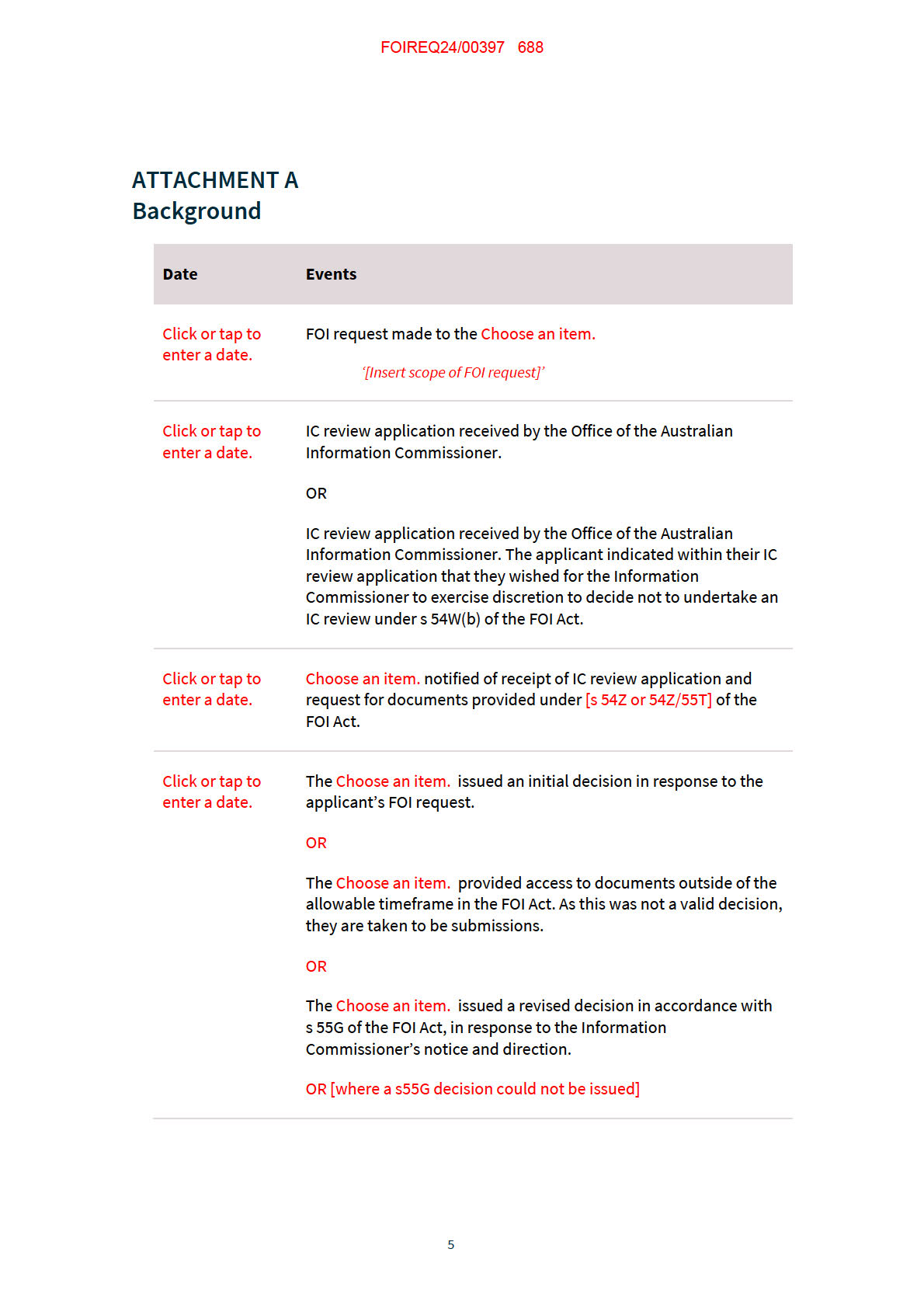
FOIREQ24/00397 689
Choose an item. submission received to establish why the
Information Commissioner should make a decision adverse to the
applicant under s 55D(1) of the FOI Act.
Click or tap to
An officer of the Information Commissioner requested the
enter a date.
applicant/ Agency/Minister /parties provide submissions as to why
the Information Commissioner should not exercise discretion to
finalise IC review application s 54W(b) of the FOI Act
Submissions were requested from the applicant/ Agency/Minister
/parties for consideration by the Information Commissioner, or a
delegated member of staff, by Click or tap to enter a date.
Click or tap to
Applicant s 54W(b) submissions received, advising:
enter a date.
‘[insert applicant submissions (these may be included in the IC
review application]’
Click or tap to
Choose an item. s 54W(b) submissions received, advising:
enter a date.
‘[insert Agency/Minister submissions (these will be in response to
the IC’s 54W(b) ITD]’
Click or tap to
An officer of the Information Commissioner provided the applicant
enter a date.
with the Agency’s/Minister’s submission.
Fulsome submissions were requested from the applicant for
consideration by the Information Commissioner, or a delegated
member of staff, by Click or tap to enter a date.
Click or tap to
Further s 54W(b) submissions received from the applicant,
enter a date.
advising:
‘[insert applicant’s further submissions (these will be in response to
the IC’s 54W(b) ITD]’
6
FOIREQ24/00397 690
Review rights
Judicial review
You can apply to the Federal Court of Australia or the Federal Circuit Court for a review of a
decision of the Information Commissioner if you think that a decision by the Information
Commissioner not to review or not to continue to undertake review of this IC review
application under the Freedom of Information Act 1982 (the FOI Act) is not legal y correct.
You can make this application under the Administrative Decisions (Judicial Review) Act 1977.
The Court will not review the merits of your case, but it may refer the matter back to the
Information Commissioner for further consideration if it finds the decision was wrong in law
or the Information Commissioner's powers were not exercised properly.
An application for review must be made to the Court within 28 days of the OAIC sending the
decision or determination to you. You may wish to seek legal advice as the process can
involve fees and costs. Please contact the Federal Court registry in your state or territory for
more information or visit the Federal Court website.4
Making a complaint to the Commonwealth Ombudsman
If you believe you have been treated unfairly by the OAIC, you can make a complaint to the
Commonwealth Ombudsman (the Ombudsman). The Ombudsman's services are free. The
Ombudsman can investigate complaints about the administrative actions of Australian
Government agencies to see if you have been treated unfairly.
If the Ombudsman finds your complaint is justified, the Ombudsman can recommend that
the OAIC reconsider or change its action or decision or take any other action that the
Ombudsman considers is appropriate. You can contact the Ombudsman's office for more
information on 1300 362 072 or visit the Commonwealth Ombudsman’s website.5
Accessing your information
If you would like access to the information that we hold about you, please contact us.
More information is available on our website. 6
4 See Federal Court of Australia
5 See Commonwealth Ombudsman
6 See About us: Access our information
7
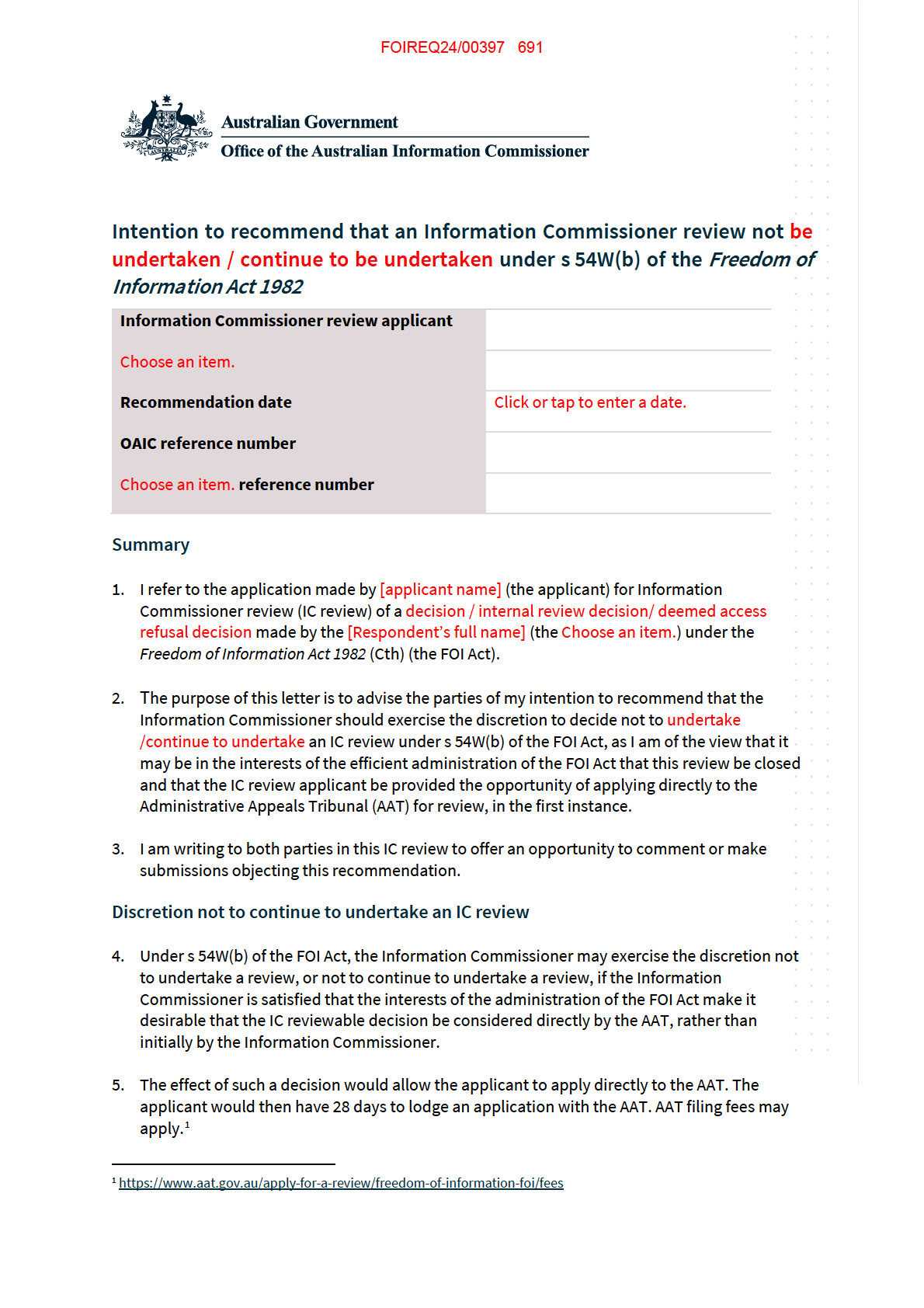

FOIREQ24/00397 692
6. This is also referred to in the Guidelines issued by the Australian Information Commissioner
under s 93A (FOI Guidelines) at [10.104] and [10.105], which states:
The Information Commissioner may decline to undertake a review if satisfied ‘that the interests of
the administration of the [FOI] Act make it desirable’ that the AAT consider the IC reviewable
decision (s 54W(b)). It is intended that the Information Commissioner will resolve most IC review
applications. Circumstances in which the Information Commissioner may decide that it is desirable
for the AAT to consider the IC reviewable decision instead of the Information Commissioner
continuing with the IC review include:2
• where the IC review is linked to ongoing proceedings before the AAT or a court
• where there is an apparent inconsistency between earlier IC review decisions and AAT
decisions
• where, should the application progress to an IC review decision, the IC review decision is likely
to be taken on appeal to the AAT on a disputed issue of fact
• where the FOI decision under review is of a level of complexity that it will be more
appropriately handled through the procedures of the AAT
• where there may be a perceived or actual conflict of interest in the Information Commissioner
undertaking the IC review, including where:
- the FOI request under review was made to, or decided by, the Information
Commissioner or their delegate
- the FOI request or material at issue relate to specific functions exercised by the
Information Commissioner under the Privacy Act
- the applicant has active matters in other forums, including the AAT or Federal Court
and the Information Commissioner is the respondent
• where consideration by the AAT would further the objects of the FOI Act, particularly in relation
to the performance and exercise of functions and powers given by the FOI Act to facilitate and
promote public access to information, promptly and at the lowest reasonable cost (s 3(4)).
7. However, the circumstances in which the Information Commissioner may consider it
desirable that the AAT consider the IC review application, as outlined in the FOI Guidelines
above, are not exhaustive. There will be circumstances that are not listed where the
Information Commissioner may deem it desirable to refer the matter to the AAT.
Reasons for recommendation
8. In this IC review, it appears that it may be in the interests of the efficient administration of the
FOI Act that that a delegate of the Information Commissioner exercises the discretion to
decide not to undertake / continue to undertake an IC review under s 54W(b) of the FOI Act
because:
2 See McKinnon and Department of Immigration and Citizenship [2012] AICmr 34

FOIREQ24/00397 693
• [Insert reasons]
Next steps
9. The Office of the Information Commissioner (OAIC) may take into account the views of the
parties to an IC review before concluding an IC review pursuant to s 54W(b). While the
Information Commissioner will consider the views of the review parties before finalising an IC
review under s 54W(b), the decision whether it is more appropriate for the AAT to consider the
IC reviewable decision ultimately rests with the Information Commissioner. Through the
functions conferred on the Information Commissioner under the FOI Act, the Information
Commissioner will be in the most informed position to determine whether the interests of the
administration of the FOI Act make it desirable for the AAT consider the IC reviewable decision.
10. If you disagree with this proposed recommendation, please write to us by Click or tap to enter
a date.
[1-2 weeks] and advise us of your reasons. If you agree with the proposed
recommendation, you are not required to respond. However, should either party wish to
provide additional information for consideration by the Information Commissioner, or a
delegated member of staff, you may do so by the abovementioned date.
9. If more time is needed, a request for an extension of time must be made to the OAIC at the
earliest opportunity within the period provided for response, and no later than 2 days before
that period is due to expire. Requests for more time must explain the exceptional
circumstances that necessitate additional time and propose a new date for response.
Approval of an extension request is at the discretion of the OAIC.
11. The parties will be notified and provided review rights if the IC review is finalised under s 54W(b)
of the FOI Act.
Yours sincerely,
[OAIC Officer]
Review Advisor
Freedom of Information Branch
Office of the Australian Information Commissioner
DD Month 2024
FOIREQ24/00397 694
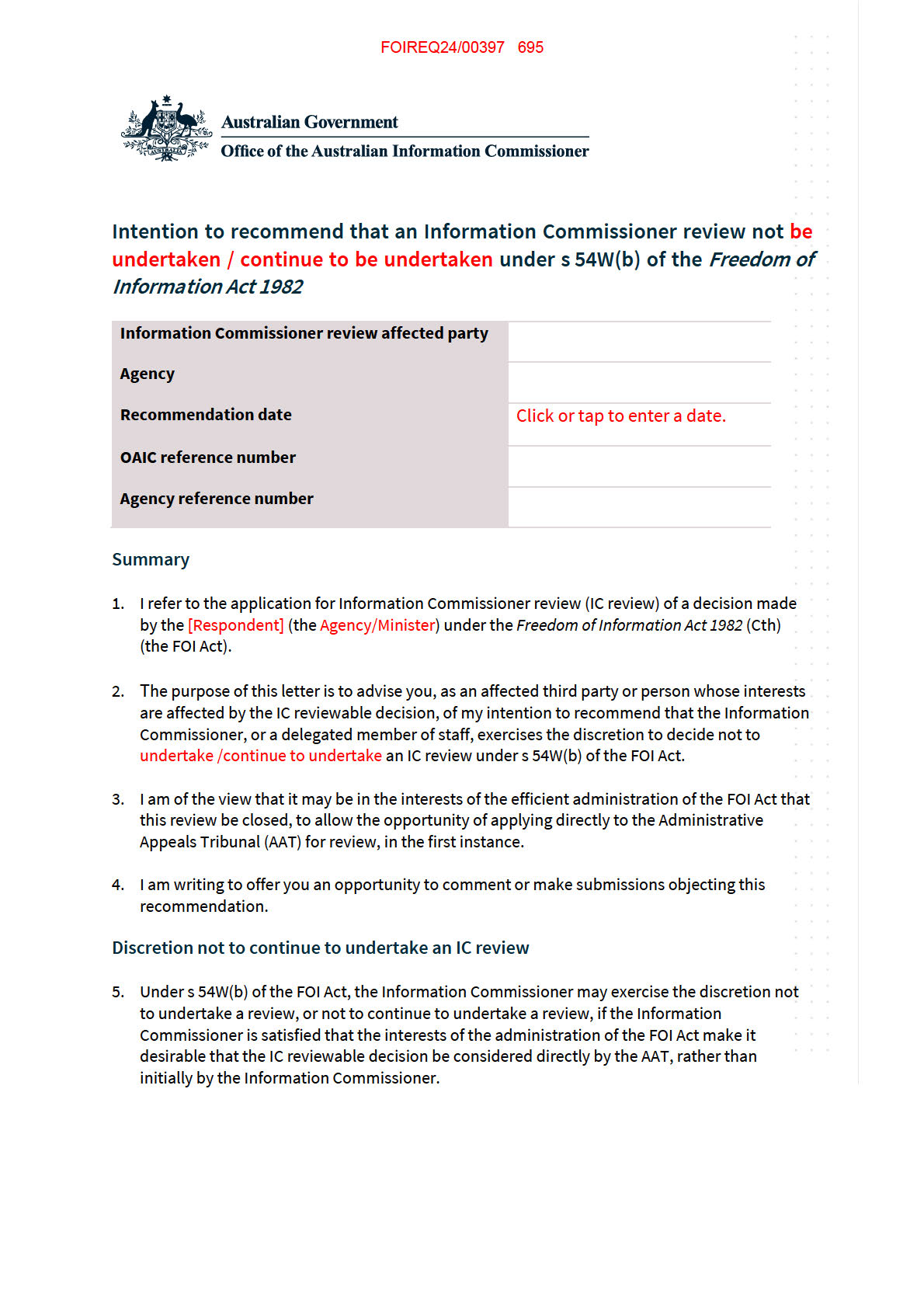

FOIREQ24/00397 696
6. The effect of such a decision would al ow the applicant to apply directly to the AAT. The
applicant would then have 28 days to lodge an application with the AAT. AAT filing fees may
apply.1
7. This is also referred to in the Guidelines issued by the Australian Information Commissioner
under s 93A (FOI Guidelines) at [10.104] and [10.105], which states:
The Information Commissioner may decline to undertake a review if satisfied ‘that the interests of
the administration of the [FOI] Act make it desirable’ that the AAT consider the IC reviewable
decision (s 54W(b)). It is intended that the Information Commissioner will resolve most IC review
applications. Circumstances in which the Information Commissioner may decide that it is desirable
for the AAT to consider the IC reviewable decision instead of the Information Commissioner
continuing with the IC review include:2
• where the IC review is linked to ongoing proceedings before the AAT or a court
• where there is an apparent inconsistency between earlier IC review decisions and AAT
decisions
• where, should the application progress to an IC review decision, the IC review decision is likely
to be taken on appeal to the AAT on a disputed issue of fact
• where the FOI decision under review is of a level of complexity that it will be more
appropriately handled through the procedures of the AAT
• where there may be a perceived or actual conflict of interest in the Information Commissioner
undertaking the IC review, including where:
- the FOI request under review was made to, or decided by, the Information
Commissioner or their delegate
- the FOI request or material at issue relate to specific functions exercised by the
Information Commissioner under the Privacy Act
- the applicant has active matters in other forums, including the AAT or Federal Court
and the Information Commissioner is the respondent
• where consideration by the AAT would further the objects of the FOI Act, particularly in relation
to the performance and exercise of functions and powers given by the FOI Act to facilitate and
promote public access to information, promptly and at the lowest reasonable cost (s 3(4)).
8. However, the circumstances in which the Information Commissioner may consider it
desirable that the AAT consider the IC review application, as outlined in the FOI Guidelines
above, are not exhaustive. There will be circumstances that are not listed where the
Information Commissioner may deem it desirable to refer the matter to the AAT.
1 See Administrative Appeals Tribunal - Fees
2 See McKinnon and Department of Immigration and Citizenship [2012] AICmr 34

FOIREQ24/00397 697
Reasons for recommendation
9. In this IC review, it appears that it may be in the interests of the efficient administration of the
FOI Act that that the Information Commissioner, or a delegated member of staff, exercises the
discretion to decide not to undertake / continue to undertake an IC review under s 54W(b) of
the FOI Act because:
• [insert reasons – example below]
• The documents at issue appear complex, requiring technical knowledge of the subject
matter, including, procedural knowledge related to the assessment of the information
only known by the third parties, and the ability to determine the detriment that could
occur arising from disclosure.
• Notably, the documents at issue contain information belonging to or relating to a third
party / multiple third parties who were consulted during the processing of the FOI
request, whose interests were identified as being affected by the decision. I believe it is
reasonable to contend that to reach resolution of the matter it may require a formal
hearing to enable oral submissions, and cross examination of the affidavit evidence so
as to al ow the parties sufficient opportunity to present how the decision affects their
interests. This approach is more suited to the processes of the AAT than the IC review
process, which is intended to be an informal process with matters review on the papers
rather than through formal hearings.
• With consideration to the above, I further believe that the decision may be better suited
to the flexible dispute resolution processes of the AAT, which are not available to the
Information Commissioner. For example, under s 35 of the
Administrative Appeals
Tribunal Act 1975 (AAT Act) the Tribunal may, by order, direct that a hearing (or part of a
hearing) takes place in private where the Tribunal can also give directions prohibiting
or restricting the publication of information lodged or otherwise given.3 In addition to
this, s 34E of the AAT Act provides that evidence of anything said, or any act done, at an
alternative dispute resolution process is inadmissible in any court or in any proceeding
before a person authorised by a law of the Commonwealth or of a State or Territory to
hear evidence.4
• I am further minded to conclude that reaching a resolution may exhaust a substantial
amount of Information Commissioner resources over a significant period where,
ultimately, any IC review decision made by the Information Commissioner may be
taken on appeal to the AAT by either the affected third party, the FOI applicant or the
Agency.
3 See Administrative Appeals Tribunal Act 1975 – Section 35
4 Administrative Appeals Tribunal Act 1975 - Section 34E

FOIREQ24/00397 698
Next steps
10. The Office of the Information Commissioner (OAIC) may take into account the views of the
parties to an IC review before concluding an IC review pursuant to s 54W(b). While the
Information Commissioner will consider the views of the review parties before finalising an IC
review under s 54W(b), the decision whether it is more appropriate for the AAT to consider the
IC reviewable decision ultimately rests with the Information Commissioner. Through the
functions conferred on the Information Commissioner under the FOI Act, the Information
Commissioner will be in the most informed position to determine whether the interests of the
administration of the FOI Act make it desirable for the AAT consider the IC reviewable
decision.
11. If you disagree with this proposed recommendation, please write to us by Click or tap to enter
a date.
[1-2 weeks] and advise us of your reasons. If you agree with the proposed
recommendation, you are not required to respond. However, should you wish to provide
additional information for consideration by the Information Commissioner, or a delegated
member of staff, you may do so by the abovementioned date.
12. If more time is needed, a request for an extension of time must be made to the OAIC at the
earliest opportunity within the period provided for response, and no later than 2 days before
that period is due to expire. Requests for more time must explain the exceptional
circumstances that necessitate additional time and propose a new date for response.
Approval of an extension request is at the discretion of the OAIC.
13. You will be notified and provided review rights if the IC review is finalised under s 54W(b) of
the FOI Act.
Yours sincerely,
[OAIC Officer]
Review Advisor
Freedom of Information Branch
Office of the Australian Information Commissioner
DD Month 2024


FOIREQ24/00397 699
Subject line: OAIC – MR – s 54W(b) - Recommendation not to undertake / continue to undertake an
Information Commissioner review
Our reference:
Agency/Minister reference:
Affected Party
Agency/Minister
By email: [Email address of Affected Party]
Recommendation not to undertake / continue to undertake an Information
Commissioner review under s 54W(b) of the FOI Act
Good morning/afternoon [Contact person of Affected Party]
Please find
attached correspondence in relation to this Information Commissioner review.
If you disagree with the proposed recommendation, please write to us by
DD Month 2024 and
advise us of your reasons.
If you require assistance regarding this email, please contact us at xxxxx@xxxx.xxx.xx.
Please quote the reference MR in all correspondence.
Kind regards,
Georgia Furlong (she/her)
Review Advisor
Freedom of Information Branch
Office of the Australian Information Commissioner
Sydney
P 1300 363 992
E xxxxx@xxxx.xxx.xx
The OAIC acknowledges Traditional Custodians of Country across Australia and their continuing connection to land,
waters and communities. We pay our respect to First Nations people, cultures and Elders past and present.
Subscribe to Information Matters
FOIREQ24/00397 700
Draft s54X Correspondence
Subject line: OAIC – MR– s 54X – Notification of a decision not to undertake/ continue to undertake
an Information Commissioner review
Our reference:
Agency/Minister reference:
Affected Party
Agency
By email: [Affected Party Email Address]
Notification of a decision not to undertake/ continue to undertake an
Information Commissioner review
Dear [Affected Party],
In accordance with s 54X of the
Freedom of Information Act 1982 (the FOI Act), you are being
notified that the Information Commissioner has today concluded the Information Commissioner
review under s 54W(b) of the FOI Act.
An excerpt of the reasons for decision is provided below:
[insert screenshot of the ‘reasons for decision’ paragraph/s from pdf 54W(b) decision]
The applicant 28 calendar days from today to lodge an application for review with the
Administrative Appeals Tribunal (the AAT), in accordance with s 57A of
the Administrative Appeals
Tribunal Act 1975 (the AAT Act).
Under s 60AA of the FOI Act, the Agency/Minister has an obligation to notify any person whose
interests are affected by the decision that an application has been made to the AAT.
Section 30(1A) of the AAT Act provides that, if an application has been made by a person for a
review of a decision, any other person whose interests are affected by the decision may apply to
be made a party to the proceeding.
Please direct all future correspondence relating to the decision to the Agency/Minister.
I confirm our file is now closed.
Kind regards,





















